begin quote from:
https://www.cnn.com/2020/09/14/world/venus-phosphine-gas-clouds-scn/index.html
A gas found on Earth that signifies life has been detected in the clouds on Venus

Photos: Wonders of the universe
Galaxy NGC 4485 collided with its larger galactic neighbor NGC 4490 millions of years ago, leading to the creation of new stars seen in the right side of the image.
Hide Caption
98 of 195

Photos: Wonders of the universe
Astronomers developed a mosaic of the distant universe, called the Hubble Legacy Field, that documents 16 years of observations from the Hubble Space Telescope. The image contains 200,000 galaxies that stretch back through 13.3 billion years of time to just 500 million years after the Big Bang.
Hide Caption
99 of 195

Photos: Wonders of the universe
A ground-based telescope's view of the Large Magellanic Cloud, a neighboring galaxy of our Milky Way. The inset was taken by the Hubble Space Telescope and shows one of the star clusters in the galaxy.
Hide Caption
100 of 195

Photos: Wonders of the universe
Hide Caption
101 of 195

Photos: Wonders of the universe
One of the brightest planetary nebulae on the sky and first discovered in 1878, nebula NGC 7027 can be seen toward the constellation of the Swan.
Hide Caption
102 of 195

Photos: Wonders of the universe
The asteroid 6478 Gault is seen with the NASA/ESA Hubble Space Telescope, showing two narrow, comet-like tails of debris that tell us that the asteroid is slowly undergoing self-destruction. The bright streaks surrounding the asteroid are background stars. The Gault asteroid is located 214 million miles from the Sun, between the orbits of Mars and Jupiter.
Hide Caption
103 of 195

Photos: Wonders of the universe
The ghostly shell in this image is a supernova, and the glowing trail leading away from it is a pulsar.
Hide Caption
104 of 195

Photos: Wonders of the universe
Hidden in one of the darkest corners of the Orion constellation, this Cosmic Bat is spreading its hazy wings through interstellar space two thousand light-years away. It is illuminated by the young stars nestled in its core — despite being shrouded by opaque clouds of dust, their bright rays still illuminate the nebula.
Hide Caption
105 of 195

Photos: Wonders of the universe
In this illustration, several dust rings circle the sun. These rings form when planets' gravities tug dust grains into orbit around the sun. Recently, scientists have detected a dust ring at Mercury's orbit. Others hypothesize the source of Venus' dust ring is a group of never-before-detected co-orbital asteroids.
Hide Caption
106 of 195

Photos: Wonders of the universe
This is an artist's impression of globular star clusters surrounding the Milky Way.
Hide Caption
107 of 195

Photos: Wonders of the universe
An artist's impression of life on a planet in orbit around a binary star system, visible as two suns in the sky.
Hide Caption
108 of 195

Photos: Wonders of the universe
An artist's illustration of one of the most distant solar system objects yet observed, 2018 VG18 -- also known as "Farout." The pink hue suggests the presence of ice. We don't yet have an idea of what "FarFarOut" looks like.
Hide Caption
109 of 195

Photos: Wonders of the universe
This is an artist's concept of the tiny moon Hippocamp that was discovered by the Hubble Space Telescope. Only 20 miles across, it may actually be a broken-off fragment from a much larger neighboring moon, Proteus, seen as a crescent in the background.
Hide Caption
110 of 195

Photos: Wonders of the universe
In this illustration, an asteroid (bottom left) breaks apart under the powerful gravity of LSPM J0207+3331, the oldest, coldest white dwarf known to be surrounded by a ring of dusty debris. Scientists think the system's infrared signal is best explained by two distinct rings composed of dust supplied by crumbling asteroids.
Hide Caption
111 of 195

Photos: Wonders of the universe
An artist's impression of the warped and twisted Milky Way disk. This happens when the rotational forces of the massive center of the galaxy tug on the outer disk.
Hide Caption
112 of 195

Photos: Wonders of the universe
This 1.3-kilometer (0.8-mile)-radius Kuiper Belt Object discovered by researchers on the edge of the solar system is believed to be the step between balls of dust and ice and fully formed planets.
Hide Caption
113 of 195

Photos: Wonders of the universe
A selfie taken by NASA's Curiosity Mars rover on Vera Rubin Ridge before it moves to a new location.
Hide Caption
114 of 195

Photos: Wonders of the universe
The Hubble Space Telescope found a dwarf galaxy hiding behind a big star cluster that's in our cosmic neighborhood. It's so old and pristine that researchers have dubbed it a "living fossil" from the early universe.
Hide Caption
115 of 195

Photos: Wonders of the universe
How did massive black holes form in the early universe? The rotating gaseous disk of this dark matter halo breaks apart into three clumps that collapse under their own gravity to form supermassive stars. Those stars will quickly collapse and form massive black holes.
Hide Caption
116 of 195

Photos: Wonders of the universe
NASA's Spitzer Space Telescope captured this image of the Large Magellanic Cloud, a satellite galaxy to our own Milky Way galaxy. Astrophysicists now believe it could collide with our galaxy in two billion years.
Hide Caption
117 of 195

Photos: Wonders of the universe
A mysterious bright object in the sky, dubbed "The Cow," was captured in real time by telescopes around the world. Astronomers believe that it could be the birth of a black hole or neutron star, or a new class of object.
Hide Caption
118 of 195
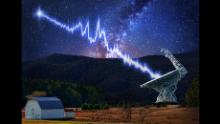
Photos: Wonders of the universe
An illustration depicts the detection of a repeating fast radio burst from a mysterious source 3 billion light-years from Earth.
Hide Caption
119 of 195

Photos: Wonders of the universe
Comet 46P/Wirtanen will pass within 7 million miles of Earth on December 16. It's ghostly green coma is the size of Jupiter, even though the comet itself is about three-quarters of a mile in diameter.
Hide Caption
120 of 195

Photos: Wonders of the universe
This mosaic image of asteroid Bennu is composed of 12 PolyCam images collected on December 2 by the OSIRIS-REx spacecraft from a range of 15 miles.
Hide Caption
121 of 195

Photos: Wonders of the universe
This image of a globular cluster of stars by the Hubble Space Telescope is one of the most ancient collections of stars known. The cluster, called NGC 6752, is more than 10 billion years old.
Hide Caption
122 of 195

Photos: Wonders of the universe
An image of Apep captured with the VISIR camera on the European Southern Observatory's Very Large Telescope. This "pinwheel" star system is most likely doomed to end in a long-duration gamma-ray burst.
Hide Caption
123 of 195

Photos: Wonders of the universe
An artist's impression of galaxy Abell 2597, showing the supermassive black hole expelling cold molecular gas like the pump of a giant intergalactic fountain.
Hide Caption
124 of 195

Photos: Wonders of the universe
An image of the Wild Duck Cluster, where every star is roughly 250 million years old.
Hide Caption
125 of 195

Photos: Wonders of the universe
These images reveal the final stage of a union between pairs of galactic nuclei in the messy cores of colliding galaxies.
Hide Caption
126 of 195

Photos: Wonders of the universe
A radio image of hydrogen gas in the Small Magellanic Cloud. Astronomers believe that the dwarf galaxy is slowly dying and will eventually be consumed by the Milky Way.
Hide Caption
127 of 195

Photos: Wonders of the universe
Further evidence of a supermassive black hole at the center of the Milky Way galaxy has been found. This visualization uses data from simulations of orbital motions of gas swirling around about 30% of the speed of light on a circular orbit around the black hole.
Hide Caption
128 of 195

Photos: Wonders of the universe
Does this look like a bat to you? This giant shadow comes from a bright star reflecting against the dusty disk surrounding it.
Hide Caption
129 of 195

Photos: Wonders of the universe
Hey, Bennu! NASA's OSIRIS-REx mission, on its way to meet the primitive asteroid Bennu, is sending back images as it gets closer to its December 3 target.
Hide Caption
130 of 195

Photos: Wonders of the universe
These three panels reveal a supernova before, during and after it happened 920 million light-years from Earth(from left to right). The supernova, dubbed iPTF14gqr, is unusual because although the star was massive, its explosion was quick and faint. Researchers believe this is due to a companion star that siphoned away its mass.
Hide Caption
131 of 195

Photos: Wonders of the universe
An artist's illustration of Planet X, which could be shaping the orbits of smaller extremely distant outer solar system objects like 2015 TG387.
Hide Caption
132 of 195

Photos: Wonders of the universe
This is an artist's concept of what SIMP J01365663+0933473 might look like. It has 12.7 times the mass of Jupiter but a magnetic field 200 times more powerful than Jupiter's. This object is 20 light-years from Earth. It's on the boundary line between being a planet or being a brown dwarf.
Hide Caption
133 of 195

Photos: Wonders of the universe
The Andromeda galaxy cannibalized and shredded the once-large galaxy M32p, leaving behind this compact galaxy remnant known as M32. It is completely unique and contains a wealth of young stars.
Hide Caption
134 of 195

Photos: Wonders of the universe
Twelve new moons have been found around Jupiter. This graphic shows various groupings of the moons and their orbits, with the newly discovered ones shown in bold.
Hide Caption
135 of 195

Photos: Wonders of the universe
Scientists and observatories around the world were able to trace a high-energy neutrino to a galaxy with a supermassive, rapidly spinning black hole at its center, known as a blazar. The galaxy sits to the left of Orion's shoulder in his constellation and is about 4 billion light-years from Earth.
Hide Caption
136 of 195

Photos: Wonders of the universe
Planets don't just appear out of thin air -- but they do require gas, dust and other processes not fully understood by astronomers. This is an artist's impression of what "infant" planets look like forming around a young star.
Hide Caption
137 of 195

Photos: Wonders of the universe
These negative images of 2015 BZ509, which is circled in yellow, show the first known interstellar object that has become a permanent part of our solar system. The exo-asteroid was likely pulled into our solar system from another star system 4.5 billion years ago. It then settled into a retrograde orbit around Jupiter.
Hide Caption
138 of 195

Photos: Wonders of the universe
A close look at the diamond matrix in a meteorite that landed in Sudan in 2008. This is considered to be the first evidence of a proto-planet that helped form the terrestrial planets in our solar system.
Hide Caption
139 of 195

Photos: Wonders of the universe
2004 EW95 is the first carbon-rich asteroid confirmed to exist in the Kuiper Belt and a relic of the primordial solar system. This curious object probably formed in the asteroid belt between Mars and Jupiter before being flung billions of miles to its current home in the Kuiper Belt.
Hide Caption
140 of 195

Photos: Wonders of the universe
The NASA/ESA Hubble Space Telescope is celebrating its 28th anniversary in space with this stunning and colorful image of the Lagoon Nebula 4,000 light-years from Earth. While the whole nebula is 55 light-years across, this image only reveals a portion of about four light-years.
Hide Caption
141 of 195

Photos: Wonders of the universe
This is a more star-filled view of the Lagoon Nebula, using Hubble's infrared capabilities. The reason you can see more stars is because infrared is able to cut through the dust and gas clouds to reveal the abundance of both young stars within the nebula, as well as more distant stars in the background.
Hide Caption
142 of 195

Photos: Wonders of the universe
The Rosette Nebula is 5,000 light-years from Earth. The distinctive nebula, which some claim looks more like a skull, has a hole in the middle that creates the illusion of its rose-like shape.
Hide Caption
143 of 195
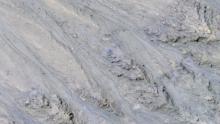
Photos: Wonders of the universe
This inner slope of a Martian crater has several of the seasonal dark streaks called "recurrent slope lineae," or RSL, that a November 2017 report interprets as granular flows, rather than darkening due to flowing water. The image is from the HiRISE camera on NASA's Mars Reconnaissance Orbiter.
Hide Caption
144 of 195
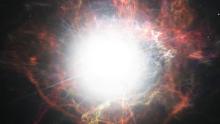
Photos: Wonders of the universe
This artist's impression shows a supernova explosion, which contains the luminosity of 100 million suns. Supernova iPTF14hls, which has exploded multiple times, may be the most massive and longest-lasting ever observed.
Hide Caption
145 of 195
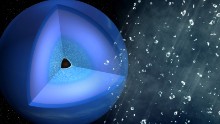
Photos: Wonders of the universe
This illustration shows hydrocarbon compounds splitting into carbon and hydrogen inside ice giants, such as Neptune, turning into a "diamond (rain) shower."
Hide Caption
146 of 195
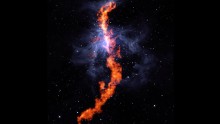
Photos: Wonders of the universe
This striking image is the stellar nursery in the Orion Nebula, where stars are born. The red filament is a stretch of ammonia molecules measuring 50 light-years long. The blue represents the gas of the Orion Nebula. This image is a composite of observation from the Robert C. Byrd Green Bank Telescope and NASA's Wide-field Infrared Survey Explore telescope. "We still don't understand in detail how large clouds of gas in our Galaxy collapse to form new stars," said Rachel Friesen, one of the collaboration's co-Principal Investigators. "But ammonia is an excellent tracer of dense, star-forming gas."
Hide Caption
147 of 195
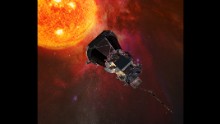
Photos: Wonders of the universe
This is an illustration of the Parker Solar Probe spacecraft approaching the sun. The NASA probe will explore the sun's atmosphere in a mission that begins in the summer of 2018.
Hide Caption
148 of 195

Photos: Wonders of the universe
See that tiny dot between Saturn's rings? That's Earth, as seen by the Cassini mission on April 12, 2017. "Cassini was 870 million miles away from Earth when the image was taken," according to NASA. "Although far too small to be visible in the image, the part of Earth facing Cassini at the time was the southern Atlantic Ocean." Much like the famous "pale blue dot" image captured by Voyager 1 in 1990, we are but a point of light when viewed from the furthest planet in the solar system.
Hide Caption
149 of 195

Photos: Wonders of the universe
NASA's Hubble Space Telescope, using infrared technology, reveals the density of stars in the Milky Way. According to NASA, the photo -- stitched together from nine images -- contains more than a half-million stars. The star cluster is the densest in the galaxy.
Hide Caption
150 of 195
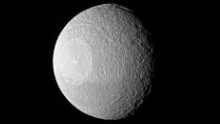
Photos: Wonders of the universe
This photo of Saturn's large icy moon, Tethys, was taken by NASA's Cassini spacecraft, which sent back some jaw-dropping images from the ringed planet.
Hide Caption
151 of 195
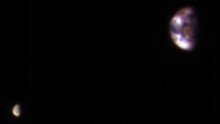
Photos: Wonders of the universe
This is what Earth and its moon look like from Mars. The image is a composite of the best Earth image and the best moon image taken on November 20, 2016, by NASA's Mars Reconnaissance Orbiter. The orbiter's camera takes images in three wavelength bands: infrared, red and blue-green. Mars was about 127 million miles from Earth when the images were taken.
Hide Caption
152 of 195
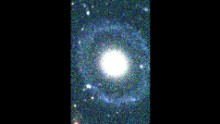
Photos: Wonders of the universe
PGC 1000714 was initially thought to be a common elliptical galaxy, but a closer analysis revealed the incredibly rare discovery of a Hoag-type galaxy. It has a round core encircled by two detached rings.
Hide Caption
153 of 195
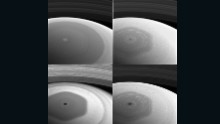
Photos: Wonders of the universe
NASA's Cassini spacecraft took these images of the planet's mysterious hexagon-shaped jetstream in December 2016. The hexagon was discovered in images taken by the Voyager spacecraft in the early 1980s. It's estimated to have a diameter wider than two Earths.
Hide Caption
154 of 195
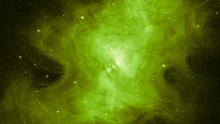
Photos: Wonders of the universe
A dead star gives off a greenish glow in this Hubble Space Telescope image of the Crab Nebula, located about 6,500 light years from Earth in the constellation Taurus. NASA released the image for Halloween 2016 and played up the theme in its press release. The agency said the "ghoulish-looking object still has a pulse." At the center of the Crab Nebula is the crushed core, or "heart" of an exploded star. The heart is spinning 30 times per second and producing a magnetic field that generates 1 trillion volts, NASA said.
Hide Caption
155 of 195
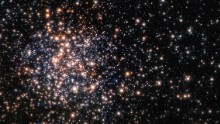
Photos: Wonders of the universe
Peering through the thick dust clouds of the galactic bulge, an international team of astronomers revealed the unusual mix of stars in the stellar cluster known as Terzan 5. The new results indicate that Terzan 5 is one of the bulge's primordial building blocks, most likely the relic of the very early days of the Milky Way.
Hide Caption
156 of 195
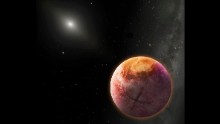
Photos: Wonders of the universe
An artist's conception of Planet Nine, which would be the farthest planet within our solar system. The similar cluster orbits of extreme objects on the edge of our solar system suggest a massive planet is located there.
Hide Caption
157 of 195
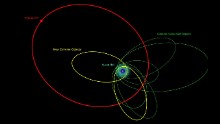
Photos: Wonders of the universe
An illustration of the orbits of the new and previously known extremely distant Solar System objects. The clustering of most of their orbits indicates that they are likely be influenced by something massive and very distant, the proposed Planet X.
Hide Caption
158 of 195
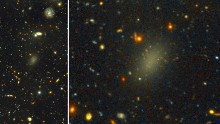
Photos: Wonders of the universe
Say hello to dark galaxy Dragonfly 44. Like our Milky Way, it has a halo of spherical clusters of stars around its core.
Hide Caption
159 of 195
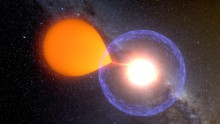
Photos: Wonders of the universe
A classical nova occurs when a white dwarf star gains matter from its secondary star (a red dwarf) over a period of time, causing a thermonuclear reaction on the surface that eventually erupts in a single visible outburst. This creates a 10,000-fold increase in brightness, depicted here in an artist's rendering.
Hide Caption
160 of 195

Photos: Wonders of the universe
Gravitational lensing and space warping are visible in this image of near and distant galaxies captured by Hubble.
Hide Caption
161 of 195
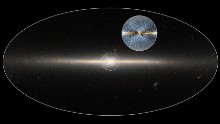
Photos: Wonders of the universe
At the center of our galaxy, the Milky Way, researchers discovered an X-shaped structure within a tightly packed group of stars.
Hide Caption
162 of 195
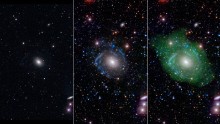
Photos: Wonders of the universe
Meet UGC 1382: What astronomers thought was a normal elliptical galaxy (left) was actually revealed to be a massive disc galaxy made up of different parts when viewed with ultraviolet and deep optical data (center and right). In a complete reversal of normal galaxy structure, the center is younger than its outer spiral disk.
Hide Caption
163 of 195

Photos: Wonders of the universe
NASA's Hubble Space Telescope captured this image of the Crab Nebula and its "beating heart," which is a neutron star at the right of the two bright stars in the center of this image. The neutron star pulses 30 times a second. The rainbow colors are visible due to the movement of materials in the nebula occurring during the time-lapse of the image.
Hide Caption
164 of 195
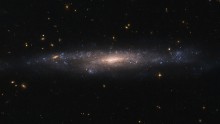
Photos: Wonders of the universe
The Hubble Space Telescope captured an image of a hidden galaxy that is fainter than Andromeda or the Milky Way. This low surface brightness galaxy, called UGC 477, is over 110 million light-years away in the constellation of Pisces.
Hide Caption
165 of 195
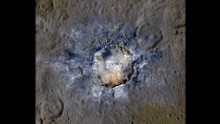
Photos: Wonders of the universe
On April 19, NASA released new images of bright craters on Ceres. This photo shows the Haulani Crater, which has evidence of landslides from its rim. Scientists believe some craters on the dwarf planet are bright because they are relatively new.
Hide Caption
166 of 195

Photos: Wonders of the universe
This illustration shows the millions of dust grains NASA's Cassini spacecraft has sampled near Saturn. A few dozen of them appear to have come from beyond our solar system.
Hide Caption
167 of 195

Photos: Wonders of the universe
This image from the VLT Survey Telescope at ESO's Paranal Observatory in Chile shows a stunning concentration of galaxies known as the Fornax Cluster, which can be found in the Southern Hemisphere. At the center of this cluster, in the middle of the three bright blobs on the left side of the image, lies a cD galaxy -- a galactic cannibal that has grown in size by consuming smaller galaxies.
Hide Caption
168 of 195
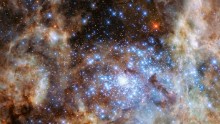
Photos: Wonders of the universe
This image shows the central region of the Tarantula Nebula in the Large Magellanic Cloud. The young and dense star cluster R136, which contains hundreds of massive stars, is visible in the lower right of the image taken by the Hubble Space Telescope.
Hide Caption
169 of 195
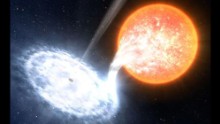
Photos: Wonders of the universe
In March 2016, astronomers published a paper on powerful red flashes coming from binary system V404 Cygni in 2015. This illustration shows a black hole, similar to the one in V404 Cygni, devouring material from an orbiting star.
Hide Caption
170 of 195

Photos: Wonders of the universe
A new map of the Milky Way was released February 24, 2016, giving astronomers a full census of the star-forming regions within our own galaxy. The APEX telescope in Chile captured this survey.
Hide Caption
171 of 195

Photos: Wonders of the universe
This image shows the elliptical galaxy NGC 4889, deeply embedded within the Coma galaxy cluster. There is a gigantic supermassive black hole at the center of the galaxy.
Hide Caption
172 of 195
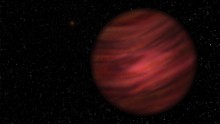
Photos: Wonders of the universe
An artist's impression of 2MASS J2126, which takens 900,000 years to orbit its star, 1 trillion kilometers away.
Hide Caption
173 of 195
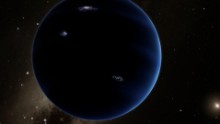
Photos: Wonders of the universe
Caltech researchers have found evidence of a giant planet tracing a bizarre, highly elongated orbit in the outer solar system. The object, nicknamed Planet Nine, has a mass about 10 times that of Earth and orbits about 20 times farther from the sun on average than does Neptune.
Hide Caption
174 of 195

Photos: Wonders of the universe
An international team of astronomers may have discovered the biggest and brightest supernova ever. The explosion was 570 billion times brighter than the sun and 20 times brighter than all the stars in the Milky Way galaxy combined, according to a statement from The Ohio State University, which is leading the study. Scientists are straining to define the supernova's strength. This image shows an artist's impression of the supernova as it would appear from an exoplanet located about 10,000 light years away.
Hide Caption
175 of 195

Photos: Wonders of the universe
Astronomers noticed huge waves of gas being "burped" by the black hole at the center of NGC 5195, a small galaxy 26 million light years from Earth. The team believes the outburst is a consequence of the interaction of NGC 5195 with a nearby galaxy.
Hide Caption
176 of 195
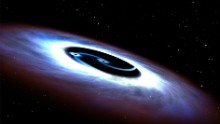
Photos: Wonders of the universe
An artist's illustration shows a binary black hole found in the quasar at the center of the Markarian 231 galaxy. Astronomers using NASA's Hubble Space Telescope discovered the galaxy being powered by two black holes "furiously whirling about each other," the space agency said in a news release.
Hide Caption
177 of 195

Photos: Wonders of the universe
An artist's impression of what a black hole might look like. In February, researchers in China said they had spotted a super-massive black hole 12 billion times the size of the sun.
Hide Caption
178 of 195
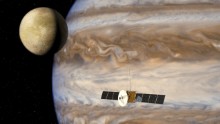
Photos: Wonders of the universe
Are there are oceans on any of Jupiter's moons? The Juice probe shown in this artist's impression aims to find out. Picture courtesy of ESA/AOES
Hide Caption
179 of 195
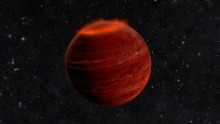
Photos: Wonders of the universe
Astronomers have discovered powerful auroras on a brown dwarf that is 20 light-years away. This is an artist's concept of the phenomenon.
Hide Caption
180 of 195
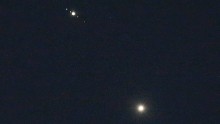
Photos: Wonders of the universe
Venus, bottom, and Jupiter shine brightly above Matthews, North Carolina, on Monday, June 29. The apparent close encounter, called a conjunction, has been giving a dazzling display in the summer sky. Although the two planets appear to be close together, in reality they are millions of miles apart.
Hide Caption
181 of 195
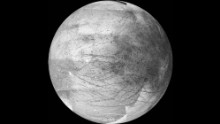
Photos: Wonders of the universe
Jupiter's icy moon Europa may be the best place in the solar system to look for extraterrestrial life, according to NASA. The moon is about the size of Earth's moon, and there is evidence it has an ocean beneath its frozen crust that may hold twice as much water as Earth. NASA's 2016 budget includes a request for $30 million to plan a mission to investigate Europa. The image above was taken by the Galileo spacecraft on November 25, 1999. It's a 12-frame mosaic and is considered the the best image yet of the side of Europa that faces Jupiter.
Hide Caption
182 of 195
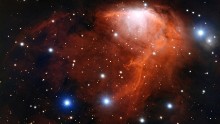
Photos: Wonders of the universe
This nebula, or cloud of gas and dust, is called RCW 34 or Gum 19. The brightest areas you can see are where the gas is being heated by young stars. Eventually the gas burst outward like champagne after a bottle is uncorked. Scientists call this champagne flow. This new image of the nebula was captured by the European Space Organization's Very Large Telescope in Chile. RCW 34 is in the constellation Vela in the southern sky. The name means "sails of a ship" in Latin.
Hide Caption
183 of 195
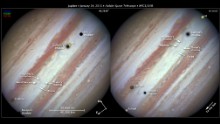
Photos: Wonders of the universe
The Hubble Space Telescope captured images of Jupiter's three great moons -- Io, Callisto, and Europa -- passing by at once.
Hide Caption
184 of 195
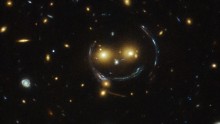
Photos: Wonders of the universe
A massive galaxy cluster known as SDSS J1038+4849 looks like a smiley face in an image captured by the Hubble Telescope. The two glowing eyes are actually two distant galaxies. And what of the smile and the round face? That's a result of what astronomers call "strong gravitational lensing." That happens because the gravitational pull between the two galaxy clusters is so strong it distorts time and space around them.
Hide Caption
185 of 195
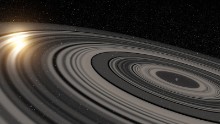
Photos: Wonders of the universe
Using powerful optics, astronomers have found a planet-like body, J1407b, with rings 200 times the size of Saturn's. This is an artist's depiction of the rings of planet J1407b, which are eclipsing a star.
Hide Caption
186 of 195
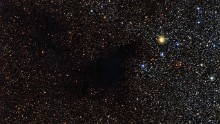
Photos: Wonders of the universe
A patch of stars appears to be missing in this image from the La Silla Observatory in Chile. But the stars are actually still there behind a cloud of gas and dust called Lynds Dark Nebula 483. The cloud is about 700 light years from Earth in the constellation Serpens (The Serpent).
Hide Caption
187 of 195

Photos: Wonders of the universe
This is the largest Hubble Space Telescope image ever assembled. It's a portion of the galaxy next door, Andromeda (M31).
Hide Caption
188 of 195

Photos: Wonders of the universe
NASA has captured a stunning new image of the so-called "Pillars of Creation," one of the space agency's most iconic discoveries. The giant columns of cold gas, in a small region of the Eagle Nebula, were popularized by a similar image taken by the Hubble Space Telescope in 1995.
Hide Caption
189 of 195
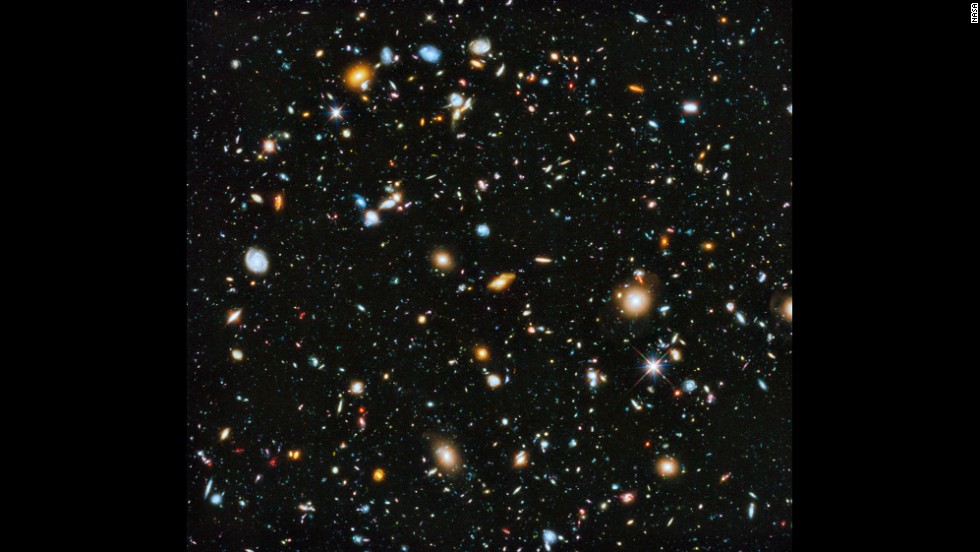
Photos: Wonders of the universe
Astronomers using the Hubble Space pieced together this picture that shows a small section of space in the southern-hemisphere constellation Fornax. Within this deep-space image are 10,000 galaxies, going back in time as far as a few hundred million years after the Big Bang.
Hide Caption
190 of 195
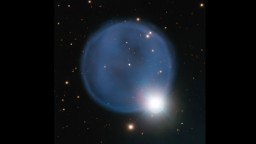
Photos: Wonders of the universe
Planetary nebula Abell 33 appears ring-like in this image, taken using the European Southern Observatory's Very Large Telescope. The blue bubble was created when an aging star shed its outer layers and a star in the foreground happened to align with it to create a "diamond engagement ring" effect.
Hide Caption
191 of 195

Photos: Wonders of the universe
This long-exposure image from the Hubble Telescope is the deepest-ever picture taken of a cluster of galaxies. The cluster, called Abell 2744, contains several hundred galaxies as they looked 3.5 billion years ago; the more distant galaxies appear as they did more than 12 billion years ago, not long after the Big Bang.
Hide Caption
192 of 195
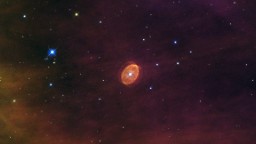
Photos: Wonders of the universe
This Hubble image looks a floating marble or a maybe a giant, disembodied eye. But it's actually a nebula with a giant star at its center. Scientists think the star used to be 20 times more massive than our sun, but it's dying and is destined to go supernova.
Hide Caption
193 of 195

Photos: Wonders of the universe
Composite image of B14-65666 showing the distributions of dust (red), oxygen (green), and carbon (blue), observed by ALMA and stars (white) observed by the Hubble Space Telescope.
Hide Caption
194 of 195

Photos: Wonders of the universe
Artist's impression of the merging galaxies B14-65666 located 13 billion light years-away.
Hide Caption
195 of 195

Photos: Wonders of the universe
An artist's illustration, left, helps visualize the details of an unusual star system, GW Orionis, in the Orion constellation. The system's circumstellar disk is broken, resulting in misaligned rings around its three stars.
Hide Caption
1 of 195

Photos: Wonders of the universe
This is a simulation of two spiral black holes that merge and emit gravitational waves.
Hide Caption
2 of 195

Photos: Wonders of the universe
This artist's illustration shows the unexpected dimming of the star Betelgeuse.
Hide Caption
3 of 195

Photos: Wonders of the universe
This extremely distant galaxy, which looks similar to our own Milky Way, appears like a ring of light.
Hide Caption
4 of 195

Photos: Wonders of the universe
This artist's interpretation shows the calcium-rich supernova 2019ehk. The orange represents the calcium-rich material created in the explosion. Purple reveals gas shed by the star right before the explosion.
Hide Caption
5 of 195

Photos: Wonders of the universe
The blue dot at the center of this image marks the approximate location of a supernova event which occurred 140 million light-years from Earth, where a white dwarf exploded and created an ultraviolet flash. It was located close to tail of the Draco constellation.
Hide Caption
6 of 195

Photos: Wonders of the universe
This radar image captured by NASA's Magellan mission to Venus in 1991 shows a corona, a large circular structure 120 miles in diameter, named Aine Corona.
Hide Caption
7 of 195

Photos: Wonders of the universe
When a star's mass is ejected during a supernova, it expands quickly. Eventually, it will slow and form a hot bubble of glowing gas. A white dwarf will emerge from this gas bubble and move across the galaxy.
Hide Caption
8 of 195

Photos: Wonders of the universe
The afterglow of short gamma ray burst that was detected 10 billion light-years away is shown here in a circle. This image was taken by the Gemini-North telescope.
Hide Caption
9 of 195

Photos: Wonders of the universe
This Hubble Space Telescope image shows NGC 7513, a barred spiral galaxy 60 million light-years away. Due to the expansion of the universe, the galaxy appears to be moving away from the Milky Way at an accelerate rate.
Hide Caption
10 of 195

Photos: Wonders of the universe
This artist's concept illustration shows what the luminous blue variable star in the Kinman Dwarf galaxy may have looked like before it mysteriously disappeared.
Hide Caption
11 of 195

Photos: Wonders of the universe
This is an artist's illustration of a supermassive black hole and its surrounding disk of gas. Inside this disk are two smaller black holes orbiting one another. Researchers identified a flare of light suspected to have come from one such binary pair soon after they merged into a larger black hole.
Hide Caption
12 of 195

Photos: Wonders of the universe
This image, taken from a video, shows what happens as two objects of different masses merge together and create gravitational waves.
Hide Caption
13 of 195

Photos: Wonders of the universe
This is an artist's impression showing the detection of a repeating fast radio burst seen in blue, which is in orbit with an astrophysical object seen in pink.
Hide Caption
14 of 195

Photos: Wonders of the universe
Fast radio bursts, which make a splash by leaving their host galaxy in a bright burst of radio waves, helped detect "missing matter" in the universe.
Hide Caption
15 of 195

Photos: Wonders of the universe
A new type of explosion was found in a tiny galaxy 500 million light-years away from Earth. This type of explosion is referred to as a fast blue optical transient.
Hide Caption
16 of 195

Photos: Wonders of the universe
Astronomers have discovered a rare type of galaxy described as a "cosmic ring of fire." This artist's illustration shows the galaxy as it existed 11 billion years ago.
Hide Caption
17 of 195

Photos: Wonders of the universe
This is an artist's impression of the Wolfe Disk, a massive rotating disk galaxy in the early universe.
Hide Caption
18 of 195

Photos: Wonders of the universe
A bright yellow "twist" near the center of this image shows where a planet may be forming around the AB Aurigae star. The image was captured by the European Southern Observatory's Very Large Telescope.
Hide Caption
19 of 195

Photos: Wonders of the universe
This artist's illustration shows the orbits of two stars and an invisible black hole 1,000 light-years from Earth. This system includes one star (small orbit seen in blue) orbiting a newly discovered black hole (orbit in red), as well as a third star in a wider orbit (also in blue).
Hide Caption
20 of 195

Photos: Wonders of the universe
This illustration shows a star's core, known as a white dwarf, pulled into orbit around a black hole. During each orbit, the black hole rips off more material from the star and pulls it into a glowing disk of material around the black hole. Before its encounter with the black hole, the star was a red giant in the last stages of stellar evolution.
Hide Caption
21 of 195

Photos: Wonders of the universe
This artist's illustration shows the collision of two 125-mile-wide icy, dusty bodies orbiting the bright star Fomalhaut, located 25 light-years away. The observation of the aftermath of this collision was once thought to be an exoplanet.
Hide Caption
22 of 195

Photos: Wonders of the universe
This is an artist's impression of the interstellar comet 2I/Borisov as it travels through our solar system. New observations detected carbon monixide in the cometary tail as the sun heated the comet.
Hide Caption
23 of 195

Photos: Wonders of the universe
This rosette pattern is the orbit of a star, called S2, around the supermassive black hole at the center of our Milky Way galaxy.
Hide Caption
24 of 195

Photos: Wonders of the universe
This is an artist's illustration of SN2016aps, which astronomers believe is the brightest supernova ever observed.
Hide Caption
25 of 195

Photos: Wonders of the universe
This is an artist's illustration of a brown dwarf, or a "failed star" object, and its magnetic field. The brown dwarf's atmosphere and magnetic field rotate at different speeds, which allowed astronomers to determine wind speed on the object.
Hide Caption
26 of 195

Photos: Wonders of the universe
This artist's illustration shows an intermediate-mass black hole tearing into a star.
Hide Caption
27 of 195

Photos: Wonders of the universe
This is an artist's impression of a large star known as HD74423 and its much smaller red dwarf companion in a binary star system. The large star appears to pulsate on one side only, and it's being distorted by the gravitational pull of its companion star into a teardrop shape.
Hide Caption
28 of 195

Photos: Wonders of the universe
This is an artist's impression of two white dwarfs in the process of merging. While astronomers expected that this might cause a supernova, they have found an instance of two white dwarf stars that survived merging.
Hide Caption
29 of 195

Photos: Wonders of the universe
A combination of space and ground-based telescopes have found evidence for the biggest explosion seen in the universe. The explosion was created by a black hole located in the Ophiuchus cluster's central galaxy, which has blasted out jets and carved a large cavity in the surrounding hot gas.
Hide Caption
30 of 195

Photos: Wonders of the universe
The red supergiant star Betelgeuse, in the constellation of Orion, has been undergoing unprecedented dimming. This image was taken in January using the European Southern Observatory's Very Large Telescope.
Hide Caption
31 of 195

Photos: Wonders of the universe
This new ALMA image shows the outcome of a stellar fight: a complex and stunning gas environment surrounding the binary star system HD101584.
Hide Caption
32 of 195

Photos: Wonders of the universe
NASA's Spitzer Space Telescope captured the Tarantula Nebula in two wavelengths of infrared light. The red represents hot gas, while the blue regions are interstellar dust.
Hide Caption
33 of 195

Photos: Wonders of the universe
A white dwarf, left, is pulling material off of a brown dwarf, right, about 3,000 light-years from Earth.
Hide Caption
34 of 195

Photos: Wonders of the universe
This image shows the orbits of the six G objects at the center of our galaxy, with the supermassive black hole indicated with a white cross. Stars, gas and dust are in the background.
Hide Caption
35 of 195

Photos: Wonders of the universe
After stars die, they expel their particles out into space, which form new stars in turn. In one case, stardust became embedded in a meteorite that fell to Earth. This illustration shows that stardust could flow from sources like the Egg Nebula to create the grains recovered from the meteorite, which landed in Australia.
Hide Caption
36 of 195

Photos: Wonders of the universe
The former North Star, Alpha Draconis or Thuban, is circled here in an image of the northern sky.
Hide Caption
37 of 195

Photos: Wonders of the universe
Galaxy UGC 2885, nicknamed the "Godzilla galaxy," may be the largest one in the local universe.
Hide Caption
38 of 195

Photos: Wonders of the universe
The host galaxy of a newly traced repeating fast radio burst acquired with the 8-meter Gemini-North telescope.
Hide Caption
39 of 195

Photos: Wonders of the universe
The Milky Way's central region was imaged using the European Southern Observatory's Very Large Telescope.
Hide Caption
40 of 195

Photos: Wonders of the universe
This is an artist's illustration of what MAMBO-9 would look like in visible light. The galaxy is very dusty and it has yet to build most of its stars. The two components show that the galaxy is in the process of merging.
Hide Caption
41 of 195

Photos: Wonders of the universe
Astronomers have found a white dwarf star surrounded by a gas disk created from an ice giant planet being torn apart by its gravity.
Hide Caption
42 of 195

Photos: Wonders of the universe
New measurements of the black hole at the center of the Holm 15A galaxy reveal it's 40 billion times more massive than our sun, making it the heaviest known black hole to be directly measured.
Hide Caption
43 of 195

Photos: Wonders of the universe
This image, which combines observations from the Chandra X-ray Observatory and the Karl Jansky Very Large Array, shows a black hole that is triggering star formation nearly one million light-years away from it. The large red bubble on the left is a hot gas bubble and the dots of light to the right of it are four galaxies where star formation has increased. The host galaxy of the black hole that released the gas bubble is the bright point of light to the right of the golden light at the center.
Hide Caption
44 of 195

Photos: Wonders of the universe
A close-up view of an interstellar comet passing through our solar system can be seen on the left. On the right, astronomers used an image of Earth for comparison.
Hide Caption
45 of 195

Photos: Wonders of the universe
The galaxy NGC 6240 hosts three supermassive black holes at its core.
Hide Caption
46 of 195

Photos: Wonders of the universe
Gamma-ray bursts are shown in this artist's illustration. They can be triggered by the collision or neutron stars or the explosion of a super massive star, collapsing into a black hole.
Hide Caption
47 of 195

Photos: Wonders of the universe
Two gaseous clouds resembling peacocks have been found in neighboring dwarf galaxy the Large Magellanic Cloud. In these images by the ALMA telescopes, red and green highlight molecular gas while blue shows ionized hydrogen gas.
Hide Caption
48 of 195

Photos: Wonders of the universe
An artist's impression of the Milky Way's big black hole flinging a star from the galaxy's center.
Hide Caption
49 of 195

Photos: Wonders of the universe
The Jack-o'-lantern Nebula is on the edge of the Milky Way. Radiation from the massive star at its center created spooky-looking gaps in the nebula that make it look like a carved pumpkin.
Hide Caption
50 of 195

Photos: Wonders of the universe
This new image from the NASA/ESA Hubble Space Telescope captures two galaxies of equal size in a collision that appears to resemble a ghostly face. This observation was made on 19 June 2019 in visible light by the telescope's Advanced Camera for Surveys.
Hide Caption
51 of 195

Photos: Wonders of the universe
A new SPHERE/VLT image of Hygiea, which could be the Solar System's smallest dwarf planet yet. As an object in the main asteroid belt, Hygiea satisfies right away three of the four requirements to be classified as a dwarf planet: it orbits around the Sun, it is not a moon and, unlike a planet, it has not cleared the neighbourhood around its orbit. The final requirement is that it have enough mass that its own gravity pulls it into a roughly spherical shape. This is what VLT observations have now revealed about Hygiea.
Hide Caption
52 of 195

Photos: Wonders of the universe
This is an artist's rendering of what a massive galaxy from the early universe might look like. The rendering shows that star formation in the galaxy is lighting up the surrounding gas. Image by James Josephides/Swinburne Astronomy Productions, Christina Williams/University of Arizona and Ivo Labbe/Swinburne.
Hide Caption
53 of 195

Photos: Wonders of the universe
This is an artist's illustration of gas and dust disk around the star HD 163296. Gaps in the disk are likely the location of baby planets that are forming.
Hide Caption
54 of 195

Photos: Wonders of the universe
This is a two-color composite image of comet 2I/Borisov captured by the Gemini North telescope on September 10.
Hide Caption
55 of 195

Photos: Wonders of the universe
This illustration shows a young, forming planet in a "baby-proof" star system.
Hide Caption
56 of 195

Photos: Wonders of the universe
Using a simulation, astronomers shed light on the faint gaseous filaments that comprise the cosmic web in a massive galaxy cluster.
Hide Caption
57 of 195

Photos: Wonders of the universe
The Hubble Space Telescope's Wide Field Camera observed Saturn in June as the planet made its closest approach to Earth this year, at approximately 1.36 billion kilometers away.
Hide Caption
58 of 195

Photos: Wonders of the universe
An artist's impression of the massive bursts of ionizing radiation exploding from the center of the Milky Way and impacting the Magellanic Stream.
Hide Caption
59 of 195

Photos: Wonders of the universe
The Atacama Large Millimeter/submillimeter Array captured this unprecedented image of two circumstellar disks, in which baby stars are growing, feeding off material from their surrounding birth disk.
Hide Caption
60 of 195

Photos: Wonders of the universe
This is an artist's illustration of what a Neptune-size moon would look like orbiting the gas giant exoplanet Kepler-1625b in a star system 8,000 light-years from Earth. It could be the first exomoon ever discovered.
Hide Caption
61 of 195

Photos: Wonders of the universe
This infrared image from NASA's Spitzer Space Telescope shows a cloud of gas and dust full of bubbles, which are inflated by wind and radiation from massive young stars. Each bubble is filled with hundreds to thousands of stars, which form from dense clouds of gas and dust.
Hide Caption
62 of 195

Photos: Wonders of the universe
This is an artist's impression of the path of the fast radio burst FRB 181112 traveling from a distant host galaxy to reach the Earth. It passed through the halo of a galaxy on the way.
Hide Caption
63 of 195

Photos: Wonders of the universe
After passing too close to a supermassive black hole, the star in this artist's conception is torn into a thin stream of gas, which is then pulled back around the black hole and slams into itself, creating a bright shock and ejecting more hot material.
Hide Caption
64 of 195

Photos: Wonders of the universe
Comparison of GJ 3512 to the Solar System and other nearby red-dwarf planetary systems. Planets around a solar-mass stars can grow until they start accreting gas and become giant planets such as Jupiter, in a few millions of years. But we thought that small stars such asProxima, TRAPPIST-1, TeegardernÕs star and GJ 3512, could not form Jupiter mass planets.
Hide Caption
65 of 195

Photos: Wonders of the universe
A collision of three galaxies has set three supermassive black holes on a crash course with each other in a system one billion light-years from Earth.
Hide Caption
66 of 195

Photos: Wonders of the universe
2I/Borisov is the first interstellar comet observed in our solar system and only the second observed interstellar visitor to our solar system.
Hide Caption
67 of 195
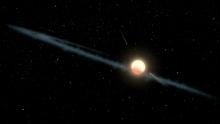
Photos: Wonders of the universe
KIC 8462852, also known as Boyajian's Star or Tabby's Star, is 1,000 light-years from us. It's 50% bigger than our sun and 1,000 degrees hotter. And it doesn't behave like any other star, dimming and brightening sporadically. Dust around the star, depicted here in an artist's illustration, may be the most likely cause of its strange behavior.
Hide Caption
68 of 195

Photos: Wonders of the universe
This is an artist's impression of a massive neutron star's pulse being delayed by the passage of a white dwarf star between the neutron star and Earth. Astronomers have detected the most massive neutron star to date due to this delay.
Hide Caption
69 of 195

Photos: Wonders of the universe
The European Southern Observatory's VISTA telescope captured a stunning image of the Large Magellanic Cloud, one of our nearest galactic neighbors. The near-infrared capability of the telescope showcases millions of individual stars.
Hide Caption
70 of 195

Photos: Wonders of the universe
Astronomers believe Comet C/2019 Q4 could be the second known interstellar visitor to our solar system. It was first spotted on August 30 and imaged by the Canada-France-Hawaii Telescope on Hawaii's Big Island on September 10, 2019.
Hide Caption
71 of 195

Photos: Wonders of the universe
A star known as S0-2, represented as the blue and green object in this artist's illustration, made its closest approach to the supermassive black hole at the center of the Milky Way in 2018. This provided a test for Einstein's theory of general relativity.
Hide Caption
72 of 195

Photos: Wonders of the universe
This is a radio image of the Milky Way's galactic center. The radio bubbles discovered by MeerKAT extend vertically above and below the plane of the galaxy.
Hide Caption
73 of 195

Photos: Wonders of the universe
A kilanova was captured by the Hubble Space Telescope in 2016, seen here next to the red arrow. Kilanovae are massive explosions that create heavy elements like gold and platinum.
Hide Caption
74 of 195

Photos: Wonders of the universe
This is an artist's depiction of a black hole about to swallow a neutron star. Detectors signaled this possible event on August 14.
Hide Caption
75 of 195

Photos: Wonders of the universe
This artist's illustration shows LHS 3844b, a rocky nearby exoplanet. It's 1.3 times the mass of Earth and orbits a cool M-dwarf star. The planet's surface is probably dark and covered in cooled volcanic material, and there is no detectable atmosphere.
Hide Caption
76 of 195

Photos: Wonders of the universe
An artist's concept of the explosion of a massive star within a dense stellar environment.
Hide Caption
77 of 195

Photos: Wonders of the universe
Galaxy NGC 5866 is 44 million light-years from Earth. It appears flat because we can only see its edge in this image captured by NASA's Spitzer Space Telescope.
Hide Caption
78 of 195

Photos: Wonders of the universe
The Hubble Space Telescope took a dazzling new portrait of Jupiter, showcasing its vivid colors and swirling cloud features in the atmosphere.
Hide Caption
79 of 195

Photos: Wonders of the universe
This is an artist's impression of the ancient massive and distant galaxies observed with ALMA.
Hide Caption
80 of 195

Photos: Wonders of the universe
Glowing gas clouds and newborn stars make up the Seagull Nebula in one of the Milky Way galaxy's spiral arms.
Hide Caption
81 of 195

Photos: Wonders of the universe
An artist's concept of what the first stars looked like soon after the Big Bang.
Hide Caption
82 of 195

Photos: Wonders of the universe
Spiral galaxy NGC 2985 lies roughly over 70 million light years from our solar system in the constellation of Ursa Major.
Hide Caption
83 of 195

Photos: Wonders of the universe
Early in the history of the universe, the Milky Way galaxy collided with a dwarf galaxy, left, which helped form our galaxy's ring and structure as it's known today.
Hide Caption
84 of 195

Photos: Wonders of the universe
An artist's illustration of a thin disc embedded in a supermassive black hole at the center of spiral galaxy NGC 3147, 130 million light-years away.
Hide Caption
85 of 195

Photos: Wonders of the universe
Hubble captured this view of a spiral galaxy named NGC 972 that appears to be blooming with new star formation. The orange glow is created as hydrogen gas reacts to the intense light streaming outwards from nearby newborn stars.
Hide Caption
86 of 195

Photos: Wonders of the universe
This is jellyfish galaxy JO201.
Hide Caption
87 of 195

Photos: Wonders of the universe
The Eta Carinae star system, located 7,500 light-years from Earth, experienced a great explosion in 1838 and the Hubble Space Telescope is still capturing the aftermath. This new ultraviolet image reveals the warm glowing gas clouds that resemble fireworks.
Hide Caption
88 of 195

Photos: Wonders of the universe
'Oumuamua, the first observed interstellar visitor to our solar system, is shown in an artist's illustration.
Hide Caption
89 of 195

Photos: Wonders of the universe
This is an artist's rendering of ancient supernovae that bombarded Earth with cosmic energy millions of years ago.
Hide Caption
90 of 195

Photos: Wonders of the universe
An artist's impression of CSIRO's Australian SKA Pathfinder radio telescope finding a fast radio burst and determining its precise location.
Hide Caption
91 of 195

Photos: Wonders of the universe
The Whirlpool galaxy has been captured in different light wavelengths. On the left is a visible light image. The next image combines visible and infrared light, while the two on the right show different wavelengths of infrared light.
Hide Caption
92 of 195

Photos: Wonders of the universe
Electrically charged C60 molecules, in which 60 carbon atoms are arranged in a hollow sphere that resembles a soccer ball, was found by the Hubble Space Telescope in the interstellar medium between star systems.
Hide Caption
93 of 195

Photos: Wonders of the universe
These are magnified galaxies behind large galaxy clusters. The pink halos reveal the gas surrounding the distant galaxies and its structure. The gravitational lensing effect of the clusters multiplies the images of the galaxies.
Hide Caption
94 of 195

Photos: Wonders of the universe
This artist's illustration shows a blue quasar at the center of a galaxy.
Hide Caption
95 of 195

Photos: Wonders of the universe
The NICER detector on the International Space Station recorded 22 months of nighttime X-ray data to create this map of the entire sky.
Hide Caption
96 of 195

Photos: Wonders of the universe
NASA's Spitzer Space Telescope captured this mosaic of the star-forming Cepheus C and Cepheus B regions.
Hide Caption
97 of 195

Photos: Wonders of the universe
Galaxy NGC 4485 collided with its larger galactic neighbor NGC 4490 millions of years ago, leading to the creation of new stars seen in the right side of the image.
Hide Caption
98 of 195

Photos: Wonders of the universe
Astronomers developed a mosaic of the distant universe, called the Hubble Legacy Field, that documents 16 years of observations from the Hubble Space Telescope. The image contains 200,000 galaxies that stretch back through 13.3 billion years of time to just 500 million years after the Big Bang.
Hide Caption
99 of 195

Photos: Wonders of the universe
A ground-based telescope's view of the Large Magellanic Cloud, a neighboring galaxy of our Milky Way. The inset was taken by the Hubble Space Telescope and shows one of the star clusters in the galaxy.
Hide Caption
100 of 195

Photos: Wonders of the universe
Hide Caption
101 of 195

Photos: Wonders of the universe
One of the brightest planetary nebulae on the sky and first discovered in 1878, nebula NGC 7027 can be seen toward the constellation of the Swan.
Hide Caption
102 of 195

Photos: Wonders of the universe
The asteroid 6478 Gault is seen with the NASA/ESA Hubble Space Telescope, showing two narrow, comet-like tails of debris that tell us that the asteroid is slowly undergoing self-destruction. The bright streaks surrounding the asteroid are background stars. The Gault asteroid is located 214 million miles from the Sun, between the orbits of Mars and Jupiter.
Hide Caption
103 of 195

Photos: Wonders of the universe
The ghostly shell in this image is a supernova, and the glowing trail leading away from it is a pulsar.
Hide Caption
104 of 195

Photos: Wonders of the universe
Hidden in one of the darkest corners of the Orion constellation, this Cosmic Bat is spreading its hazy wings through interstellar space two thousand light-years away. It is illuminated by the young stars nestled in its core — despite being shrouded by opaque clouds of dust, their bright rays still illuminate the nebula.
Hide Caption
105 of 195

Photos: Wonders of the universe
In this illustration, several dust rings circle the sun. These rings form when planets' gravities tug dust grains into orbit around the sun. Recently, scientists have detected a dust ring at Mercury's orbit. Others hypothesize the source of Venus' dust ring is a group of never-before-detected co-orbital asteroids.
Hide Caption
106 of 195

Photos: Wonders of the universe
This is an artist's impression of globular star clusters surrounding the Milky Way.
Hide Caption
107 of 195

Photos: Wonders of the universe
An artist's impression of life on a planet in orbit around a binary star system, visible as two suns in the sky.
Hide Caption
108 of 195

Photos: Wonders of the universe
An artist's illustration of one of the most distant solar system objects yet observed, 2018 VG18 -- also known as "Farout." The pink hue suggests the presence of ice. We don't yet have an idea of what "FarFarOut" looks like.
Hide Caption
109 of 195

Photos: Wonders of the universe
This is an artist's concept of the tiny moon Hippocamp that was discovered by the Hubble Space Telescope. Only 20 miles across, it may actually be a broken-off fragment from a much larger neighboring moon, Proteus, seen as a crescent in the background.
Hide Caption
110 of 195

Photos: Wonders of the universe
In this illustration, an asteroid (bottom left) breaks apart under the powerful gravity of LSPM J0207+3331, the oldest, coldest white dwarf known to be surrounded by a ring of dusty debris. Scientists think the system's infrared signal is best explained by two distinct rings composed of dust supplied by crumbling asteroids.
Hide Caption
111 of 195

Photos: Wonders of the universe
An artist's impression of the warped and twisted Milky Way disk. This happens when the rotational forces of the massive center of the galaxy tug on the outer disk.
Hide Caption
112 of 195

Photos: Wonders of the universe
This 1.3-kilometer (0.8-mile)-radius Kuiper Belt Object discovered by researchers on the edge of the solar system is believed to be the step between balls of dust and ice and fully formed planets.
Hide Caption
113 of 195

Photos: Wonders of the universe
A selfie taken by NASA's Curiosity Mars rover on Vera Rubin Ridge before it moves to a new location.
Hide Caption
114 of 195

Photos: Wonders of the universe
The Hubble Space Telescope found a dwarf galaxy hiding behind a big star cluster that's in our cosmic neighborhood. It's so old and pristine that researchers have dubbed it a "living fossil" from the early universe.
Hide Caption
115 of 195

Photos: Wonders of the universe
How did massive black holes form in the early universe? The rotating gaseous disk of this dark matter halo breaks apart into three clumps that collapse under their own gravity to form supermassive stars. Those stars will quickly collapse and form massive black holes.
Hide Caption
116 of 195

Photos: Wonders of the universe
NASA's Spitzer Space Telescope captured this image of the Large Magellanic Cloud, a satellite galaxy to our own Milky Way galaxy. Astrophysicists now believe it could collide with our galaxy in two billion years.
Hide Caption
117 of 195

Photos: Wonders of the universe
A mysterious bright object in the sky, dubbed "The Cow," was captured in real time by telescopes around the world. Astronomers believe that it could be the birth of a black hole or neutron star, or a new class of object.
Hide Caption
118 of 195

Photos: Wonders of the universe
An illustration depicts the detection of a repeating fast radio burst from a mysterious source 3 billion light-years from Earth.
Hide Caption
119 of 195

Photos: Wonders of the universe
Comet 46P/Wirtanen will pass within 7 million miles of Earth on December 16. It's ghostly green coma is the size of Jupiter, even though the comet itself is about three-quarters of a mile in diameter.
Hide Caption
120 of 195

Photos: Wonders of the universe
This mosaic image of asteroid Bennu is composed of 12 PolyCam images collected on December 2 by the OSIRIS-REx spacecraft from a range of 15 miles.
Hide Caption
121 of 195

Photos: Wonders of the universe
This image of a globular cluster of stars by the Hubble Space Telescope is one of the most ancient collections of stars known. The cluster, called NGC 6752, is more than 10 billion years old.
Hide Caption
122 of 195

Photos: Wonders of the universe
An image of Apep captured with the VISIR camera on the European Southern Observatory's Very Large Telescope. This "pinwheel" star system is most likely doomed to end in a long-duration gamma-ray burst.
Hide Caption
123 of 195

Photos: Wonders of the universe
An artist's impression of galaxy Abell 2597, showing the supermassive black hole expelling cold molecular gas like the pump of a giant intergalactic fountain.
Hide Caption
124 of 195

Photos: Wonders of the universe
An image of the Wild Duck Cluster, where every star is roughly 250 million years old.
Hide Caption
125 of 195

Photos: Wonders of the universe
These images reveal the final stage of a union between pairs of galactic nuclei in the messy cores of colliding galaxies.
Hide Caption
126 of 195

Photos: Wonders of the universe
A radio image of hydrogen gas in the Small Magellanic Cloud. Astronomers believe that the dwarf galaxy is slowly dying and will eventually be consumed by the Milky Way.
Hide Caption
127 of 195

Photos: Wonders of the universe
Further evidence of a supermassive black hole at the center of the Milky Way galaxy has been found. This visualization uses data from simulations of orbital motions of gas swirling around about 30% of the speed of light on a circular orbit around the black hole.
Hide Caption
128 of 195

Photos: Wonders of the universe
Does this look like a bat to you? This giant shadow comes from a bright star reflecting against the dusty disk surrounding it.
Hide Caption
129 of 195

Photos: Wonders of the universe
Hey, Bennu! NASA's OSIRIS-REx mission, on its way to meet the primitive asteroid Bennu, is sending back images as it gets closer to its December 3 target.
Hide Caption
130 of 195

Photos: Wonders of the universe
These three panels reveal a supernova before, during and after it happened 920 million light-years from Earth(from left to right). The supernova, dubbed iPTF14gqr, is unusual because although the star was massive, its explosion was quick and faint. Researchers believe this is due to a companion star that siphoned away its mass.
Hide Caption
131 of 195

Photos: Wonders of the universe
An artist's illustration of Planet X, which could be shaping the orbits of smaller extremely distant outer solar system objects like 2015 TG387.
Hide Caption
132 of 195

Photos: Wonders of the universe
This is an artist's concept of what SIMP J01365663+0933473 might look like. It has 12.7 times the mass of Jupiter but a magnetic field 200 times more powerful than Jupiter's. This object is 20 light-years from Earth. It's on the boundary line between being a planet or being a brown dwarf.
Hide Caption
133 of 195

Photos: Wonders of the universe
The Andromeda galaxy cannibalized and shredded the once-large galaxy M32p, leaving behind this compact galaxy remnant known as M32. It is completely unique and contains a wealth of young stars.
Hide Caption
134 of 195

Photos: Wonders of the universe
Twelve new moons have been found around Jupiter. This graphic shows various groupings of the moons and their orbits, with the newly discovered ones shown in bold.
Hide Caption
135 of 195

Photos: Wonders of the universe
Scientists and observatories around the world were able to trace a high-energy neutrino to a galaxy with a supermassive, rapidly spinning black hole at its center, known as a blazar. The galaxy sits to the left of Orion's shoulder in his constellation and is about 4 billion light-years from Earth.
Hide Caption
136 of 195

Photos: Wonders of the universe
Planets don't just appear out of thin air -- but they do require gas, dust and other processes not fully understood by astronomers. This is an artist's impression of what "infant" planets look like forming around a young star.
Hide Caption
137 of 195

Photos: Wonders of the universe
These negative images of 2015 BZ509, which is circled in yellow, show the first known interstellar object that has become a permanent part of our solar system. The exo-asteroid was likely pulled into our solar system from another star system 4.5 billion years ago. It then settled into a retrograde orbit around Jupiter.
Hide Caption
138 of 195

Photos: Wonders of the universe
A close look at the diamond matrix in a meteorite that landed in Sudan in 2008. This is considered to be the first evidence of a proto-planet that helped form the terrestrial planets in our solar system.
Hide Caption
139 of 195

Photos: Wonders of the universe
2004 EW95 is the first carbon-rich asteroid confirmed to exist in the Kuiper Belt and a relic of the primordial solar system. This curious object probably formed in the asteroid belt between Mars and Jupiter before being flung billions of miles to its current home in the Kuiper Belt.
Hide Caption
140 of 195

Photos: Wonders of the universe
The NASA/ESA Hubble Space Telescope is celebrating its 28th anniversary in space with this stunning and colorful image of the Lagoon Nebula 4,000 light-years from Earth. While the whole nebula is 55 light-years across, this image only reveals a portion of about four light-years.
Hide Caption
141 of 195

Photos: Wonders of the universe
This is a more star-filled view of the Lagoon Nebula, using Hubble's infrared capabilities. The reason you can see more stars is because infrared is able to cut through the dust and gas clouds to reveal the abundance of both young stars within the nebula, as well as more distant stars in the background.
Hide Caption
142 of 195

Photos: Wonders of the universe
The Rosette Nebula is 5,000 light-years from Earth. The distinctive nebula, which some claim looks more like a skull, has a hole in the middle that creates the illusion of its rose-like shape.
Hide Caption
143 of 195

Photos: Wonders of the universe
This inner slope of a Martian crater has several of the seasonal dark streaks called "recurrent slope lineae," or RSL, that a November 2017 report interprets as granular flows, rather than darkening due to flowing water. The image is from the HiRISE camera on NASA's Mars Reconnaissance Orbiter.
Hide Caption
144 of 195

Photos: Wonders of the universe
This artist's impression shows a supernova explosion, which contains the luminosity of 100 million suns. Supernova iPTF14hls, which has exploded multiple times, may be the most massive and longest-lasting ever observed.
Hide Caption
145 of 195

Photos: Wonders of the universe
This illustration shows hydrocarbon compounds splitting into carbon and hydrogen inside ice giants, such as Neptune, turning into a "diamond (rain) shower."
Hide Caption
146 of 195

Photos: Wonders of the universe
This striking image is the stellar nursery in the Orion Nebula, where stars are born. The red filament is a stretch of ammonia molecules measuring 50 light-years long. The blue represents the gas of the Orion Nebula. This image is a composite of observation from the Robert C. Byrd Green Bank Telescope and NASA's Wide-field Infrared Survey Explore telescope. "We still don't understand in detail how large clouds of gas in our Galaxy collapse to form new stars," said Rachel Friesen, one of the collaboration's co-Principal Investigators. "But ammonia is an excellent tracer of dense, star-forming gas."
Hide Caption
147 of 195

Photos: Wonders of the universe
This is an illustration of the Parker Solar Probe spacecraft approaching the sun. The NASA probe will explore the sun's atmosphere in a mission that begins in the summer of 2018.
Hide Caption
148 of 195

Photos: Wonders of the universe
See that tiny dot between Saturn's rings? That's Earth, as seen by the Cassini mission on April 12, 2017. "Cassini was 870 million miles away from Earth when the image was taken," according to NASA. "Although far too small to be visible in the image, the part of Earth facing Cassini at the time was the southern Atlantic Ocean." Much like the famous "pale blue dot" image captured by Voyager 1 in 1990, we are but a point of light when viewed from the furthest planet in the solar system.
Hide Caption
149 of 195

Photos: Wonders of the universe
NASA's Hubble Space Telescope, using infrared technology, reveals the density of stars in the Milky Way. According to NASA, the photo -- stitched together from nine images -- contains more than a half-million stars. The star cluster is the densest in the galaxy.
Hide Caption
150 of 195

Photos: Wonders of the universe
This photo of Saturn's large icy moon, Tethys, was taken by NASA's Cassini spacecraft, which sent back some jaw-dropping images from the ringed planet.
Hide Caption
151 of 195

Photos: Wonders of the universe
This is what Earth and its moon look like from Mars. The image is a composite of the best Earth image and the best moon image taken on November 20, 2016, by NASA's Mars Reconnaissance Orbiter. The orbiter's camera takes images in three wavelength bands: infrared, red and blue-green. Mars was about 127 million miles from Earth when the images were taken.
Hide Caption
152 of 195

Photos: Wonders of the universe
PGC 1000714 was initially thought to be a common elliptical galaxy, but a closer analysis revealed the incredibly rare discovery of a Hoag-type galaxy. It has a round core encircled by two detached rings.
Hide Caption
153 of 195

Photos: Wonders of the universe
NASA's Cassini spacecraft took these images of the planet's mysterious hexagon-shaped jetstream in December 2016. The hexagon was discovered in images taken by the Voyager spacecraft in the early 1980s. It's estimated to have a diameter wider than two Earths.
Hide Caption
154 of 195

Photos: Wonders of the universe
A dead star gives off a greenish glow in this Hubble Space Telescope image of the Crab Nebula, located about 6,500 light years from Earth in the constellation Taurus. NASA released the image for Halloween 2016 and played up the theme in its press release. The agency said the "ghoulish-looking object still has a pulse." At the center of the Crab Nebula is the crushed core, or "heart" of an exploded star. The heart is spinning 30 times per second and producing a magnetic field that generates 1 trillion volts, NASA said.
Hide Caption
155 of 195

Photos: Wonders of the universe
Peering through the thick dust clouds of the galactic bulge, an international team of astronomers revealed the unusual mix of stars in the stellar cluster known as Terzan 5. The new results indicate that Terzan 5 is one of the bulge's primordial building blocks, most likely the relic of the very early days of the Milky Way.
Hide Caption
156 of 195

Photos: Wonders of the universe
An artist's conception of Planet Nine, which would be the farthest planet within our solar system. The similar cluster orbits of extreme objects on the edge of our solar system suggest a massive planet is located there.
Hide Caption
157 of 195

Photos: Wonders of the universe
An illustration of the orbits of the new and previously known extremely distant Solar System objects. The clustering of most of their orbits indicates that they are likely be influenced by something massive and very distant, the proposed Planet X.
Hide Caption
158 of 195

Photos: Wonders of the universe
Say hello to dark galaxy Dragonfly 44. Like our Milky Way, it has a halo of spherical clusters of stars around its core.
Hide Caption
159 of 195

Photos: Wonders of the universe
A classical nova occurs when a white dwarf star gains matter from its secondary star (a red dwarf) over a period of time, causing a thermonuclear reaction on the surface that eventually erupts in a single visible outburst. This creates a 10,000-fold increase in brightness, depicted here in an artist's rendering.
Hide Caption
160 of 195

Photos: Wonders of the universe
Gravitational lensing and space warping are visible in this image of near and distant galaxies captured by Hubble.
Hide Caption
161 of 195

Photos: Wonders of the universe
At the center of our galaxy, the Milky Way, researchers discovered an X-shaped structure within a tightly packed group of stars.
Hide Caption
162 of 195

Photos: Wonders of the universe
Meet UGC 1382: What astronomers thought was a normal elliptical galaxy (left) was actually revealed to be a massive disc galaxy made up of different parts when viewed with ultraviolet and deep optical data (center and right). In a complete reversal of normal galaxy structure, the center is younger than its outer spiral disk.
Hide Caption
163 of 195

Photos: Wonders of the universe
NASA's Hubble Space Telescope captured this image of the Crab Nebula and its "beating heart," which is a neutron star at the right of the two bright stars in the center of this image. The neutron star pulses 30 times a second. The rainbow colors are visible due to the movement of materials in the nebula occurring during the time-lapse of the image.
Hide Caption
164 of 195

Photos: Wonders of the universe
The Hubble Space Telescope captured an image of a hidden galaxy that is fainter than Andromeda or the Milky Way. This low surface brightness galaxy, called UGC 477, is over 110 million light-years away in the constellation of Pisces.
Hide Caption
165 of 195

Photos: Wonders of the universe
On April 19, NASA released new images of bright craters on Ceres. This photo shows the Haulani Crater, which has evidence of landslides from its rim. Scientists believe some craters on the dwarf planet are bright because they are relatively new.
Hide Caption
166 of 195

Photos: Wonders of the universe
This illustration shows the millions of dust grains NASA's Cassini spacecraft has sampled near Saturn. A few dozen of them appear to have come from beyond our solar system.
Hide Caption
167 of 195

Photos: Wonders of the universe
This image from the VLT Survey Telescope at ESO's Paranal Observatory in Chile shows a stunning concentration of galaxies known as the Fornax Cluster, which can be found in the Southern Hemisphere. At the center of this cluster, in the middle of the three bright blobs on the left side of the image, lies a cD galaxy -- a galactic cannibal that has grown in size by consuming smaller galaxies.
Hide Caption
168 of 195

Photos: Wonders of the universe
This image shows the central region of the Tarantula Nebula in the Large Magellanic Cloud. The young and dense star cluster R136, which contains hundreds of massive stars, is visible in the lower right of the image taken by the Hubble Space Telescope.
Hide Caption
169 of 195

Photos: Wonders of the universe
In March 2016, astronomers published a paper on powerful red flashes coming from binary system V404 Cygni in 2015. This illustration shows a black hole, similar to the one in V404 Cygni, devouring material from an orbiting star.
Hide Caption
170 of 195

Photos: Wonders of the universe
A new map of the Milky Way was released February 24, 2016, giving astronomers a full census of the star-forming regions within our own galaxy. The APEX telescope in Chile captured this survey.
Hide Caption
171 of 195

Photos: Wonders of the universe
This image shows the elliptical galaxy NGC 4889, deeply embedded within the Coma galaxy cluster. There is a gigantic supermassive black hole at the center of the galaxy.
Hide Caption
172 of 195

Photos: Wonders of the universe
An artist's impression of 2MASS J2126, which takens 900,000 years to orbit its star, 1 trillion kilometers away.
Hide Caption
173 of 195

Photos: Wonders of the universe
Caltech researchers have found evidence of a giant planet tracing a bizarre, highly elongated orbit in the outer solar system. The object, nicknamed Planet Nine, has a mass about 10 times that of Earth and orbits about 20 times farther from the sun on average than does Neptune.
Hide Caption
174 of 195

Photos: Wonders of the universe
An international team of astronomers may have discovered the biggest and brightest supernova ever. The explosion was 570 billion times brighter than the sun and 20 times brighter than all the stars in the Milky Way galaxy combined, according to a statement from The Ohio State University, which is leading the study. Scientists are straining to define the supernova's strength. This image shows an artist's impression of the supernova as it would appear from an exoplanet located about 10,000 light years away.
Hide Caption
175 of 195

Photos: Wonders of the universe
Astronomers noticed huge waves of gas being "burped" by the black hole at the center of NGC 5195, a small galaxy 26 million light years from Earth. The team believes the outburst is a consequence of the interaction of NGC 5195 with a nearby galaxy.
Hide Caption
176 of 195

Photos: Wonders of the universe
An artist's illustration shows a binary black hole found in the quasar at the center of the Markarian 231 galaxy. Astronomers using NASA's Hubble Space Telescope discovered the galaxy being powered by two black holes "furiously whirling about each other," the space agency said in a news release.
Hide Caption
177 of 195

Photos: Wonders of the universe
An artist's impression of what a black hole might look like. In February, researchers in China said they had spotted a super-massive black hole 12 billion times the size of the sun.
Hide Caption
178 of 195

Photos: Wonders of the universe
Are there are oceans on any of Jupiter's moons? The Juice probe shown in this artist's impression aims to find out. Picture courtesy of ESA/AOES
Hide Caption
179 of 195

Photos: Wonders of the universe
Astronomers have discovered powerful auroras on a brown dwarf that is 20 light-years away. This is an artist's concept of the phenomenon.
Hide Caption
180 of 195

Photos: Wonders of the universe
Venus, bottom, and Jupiter shine brightly above Matthews, North Carolina, on Monday, June 29. The apparent close encounter, called a conjunction, has been giving a dazzling display in the summer sky. Although the two planets appear to be close together, in reality they are millions of miles apart.
Hide Caption
181 of 195

Photos: Wonders of the universe
Jupiter's icy moon Europa may be the best place in the solar system to look for extraterrestrial life, according to NASA. The moon is about the size of Earth's moon, and there is evidence it has an ocean beneath its frozen crust that may hold twice as much water as Earth. NASA's 2016 budget includes a request for $30 million to plan a mission to investigate Europa. The image above was taken by the Galileo spacecraft on November 25, 1999. It's a 12-frame mosaic and is considered the the best image yet of the side of Europa that faces Jupiter.
Hide Caption
182 of 195

Photos: Wonders of the universe
This nebula, or cloud of gas and dust, is called RCW 34 or Gum 19. The brightest areas you can see are where the gas is being heated by young stars. Eventually the gas burst outward like champagne after a bottle is uncorked. Scientists call this champagne flow. This new image of the nebula was captured by the European Space Organization's Very Large Telescope in Chile. RCW 34 is in the constellation Vela in the southern sky. The name means "sails of a ship" in Latin.
Hide Caption
183 of 195

Photos: Wonders of the universe
The Hubble Space Telescope captured images of Jupiter's three great moons -- Io, Callisto, and Europa -- passing by at once.
Hide Caption
184 of 195

Photos: Wonders of the universe
A massive galaxy cluster known as SDSS J1038+4849 looks like a smiley face in an image captured by the Hubble Telescope. The two glowing eyes are actually two distant galaxies. And what of the smile and the round face? That's a result of what astronomers call "strong gravitational lensing." That happens because the gravitational pull between the two galaxy clusters is so strong it distorts time and space around them.
Hide Caption
185 of 195

Photos: Wonders of the universe
Using powerful optics, astronomers have found a planet-like body, J1407b, with rings 200 times the size of Saturn's. This is an artist's depiction of the rings of planet J1407b, which are eclipsing a star.
Hide Caption
186 of 195

Photos: Wonders of the universe
A patch of stars appears to be missing in this image from the La Silla Observatory in Chile. But the stars are actually still there behind a cloud of gas and dust called Lynds Dark Nebula 483. The cloud is about 700 light years from Earth in the constellation Serpens (The Serpent).
Hide Caption
187 of 195

Photos: Wonders of the universe
This is the largest Hubble Space Telescope image ever assembled. It's a portion of the galaxy next door, Andromeda (M31).
Hide Caption
188 of 195

Photos: Wonders of the universe
NASA has captured a stunning new image of the so-called "Pillars of Creation," one of the space agency's most iconic discoveries. The giant columns of cold gas, in a small region of the Eagle Nebula, were popularized by a similar image taken by the Hubble Space Telescope in 1995.
Hide Caption
189 of 195

Photos: Wonders of the universe
Astronomers using the Hubble Space pieced together this picture that shows a small section of space in the southern-hemisphere constellation Fornax. Within this deep-space image are 10,000 galaxies, going back in time as far as a few hundred million years after the Big Bang.
Hide Caption
190 of 195

Photos: Wonders of the universe
Planetary nebula Abell 33 appears ring-like in this image, taken using the European Southern Observatory's Very Large Telescope. The blue bubble was created when an aging star shed its outer layers and a star in the foreground happened to align with it to create a "diamond engagement ring" effect.
Hide Caption
191 of 195

Photos: Wonders of the universe
This long-exposure image from the Hubble Telescope is the deepest-ever picture taken of a cluster of galaxies. The cluster, called Abell 2744, contains several hundred galaxies as they looked 3.5 billion years ago; the more distant galaxies appear as they did more than 12 billion years ago, not long after the Big Bang.
Hide Caption
192 of 195

Photos: Wonders of the universe
This Hubble image looks a floating marble or a maybe a giant, disembodied eye. But it's actually a nebula with a giant star at its center. Scientists think the star used to be 20 times more massive than our sun, but it's dying and is destined to go supernova.
Hide Caption
193 of 195

Photos: Wonders of the universe
Composite image of B14-65666 showing the distributions of dust (red), oxygen (green), and carbon (blue), observed by ALMA and stars (white) observed by the Hubble Space Telescope.
Hide Caption
194 of 195

Photos: Wonders of the universe
Artist's impression of the merging galaxies B14-65666 located 13 billion light years-away.
Hide Caption
195 of 195

Photos: Wonders of the universe
An artist's illustration, left, helps visualize the details of an unusual star system, GW Orionis, in the Orion constellation. The system's circumstellar disk is broken, resulting in misaligned rings around its three stars.
Hide Caption
1 of 195

Photos: Wonders of the universe
This is a simulation of two spiral black holes that merge and emit gravitational waves.
Hide Caption
2 of 195

Photos: Wonders of the universe
This artist's illustration shows the unexpected dimming of the star Betelgeuse.
Hide Caption
3 of 195

Photos: Wonders of the universe
This extremely distant galaxy, which looks similar to our own Milky Way, appears like a ring of light.
Hide Caption
4 of 195

Photos: Wonders of the universe
This artist's interpretation shows the calcium-rich supernova 2019ehk. The orange represents the calcium-rich material created in the explosion. Purple reveals gas shed by the star right before the explosion.
Hide Caption
5 of 195

Photos: Wonders of the universe
The blue dot at the center of this image marks the approximate location of a supernova event which occurred 140 million light-years from Earth, where a white dwarf exploded and created an ultraviolet flash. It was located close to tail of the Draco constellation.
Hide Caption
6 of 195

Photos: Wonders of the universe
This radar image captured by NASA's Magellan mission to Venus in 1991 shows a corona, a large circular structure 120 miles in diameter, named Aine Corona.
Hide Caption
7 of 195

Photos: Wonders of the universe
When a star's mass is ejected during a supernova, it expands quickly. Eventually, it will slow and form a hot bubble of glowing gas. A white dwarf will emerge from this gas bubble and move across the galaxy.
Hide Caption
8 of 195

Photos: Wonders of the universe
The afterglow of short gamma ray burst that was detected 10 billion light-years away is shown here in a circle. This image was taken by the Gemini-North telescope.
Hide Caption
9 of 195

Photos: Wonders of the universe
This Hubble Space Telescope image shows NGC 7513, a barred spiral galaxy 60 million light-years away. Due to the expansion of the universe, the galaxy appears to be moving away from the Milky Way at an accelerate rate.
Hide Caption
10 of 195

Photos: Wonders of the universe
This artist's concept illustration shows what the luminous blue variable star in the Kinman Dwarf galaxy may have looked like before it mysteriously disappeared.
Hide Caption
11 of 195

Photos: Wonders of the universe
This is an artist's illustration of a supermassive black hole and its surrounding disk of gas. Inside this disk are two smaller black holes orbiting one another. Researchers identified a flare of light suspected to have come from one such binary pair soon after they merged into a larger black hole.
Hide Caption
12 of 195

Photos: Wonders of the universe
This image, taken from a video, shows what happens as two objects of different masses merge together and create gravitational waves.
Hide Caption
13 of 195

Photos: Wonders of the universe
This is an artist's impression showing the detection of a repeating fast radio burst seen in blue, which is in orbit with an astrophysical object seen in pink.
Hide Caption
14 of 195

Photos: Wonders of the universe
Fast radio bursts, which make a splash by leaving their host galaxy in a bright burst of radio waves, helped detect "missing matter" in the universe.
Hide Caption
15 of 195

Photos: Wonders of the universe
A new type of explosion was found in a tiny galaxy 500 million light-years away from Earth. This type of explosion is referred to as a fast blue optical transient.
Hide Caption
16 of 195

Photos: Wonders of the universe
Astronomers have discovered a rare type of galaxy described as a "cosmic ring of fire." This artist's illustration shows the galaxy as it existed 11 billion years ago.
Hide Caption
17 of 195

Photos: Wonders of the universe
This is an artist's impression of the Wolfe Disk, a massive rotating disk galaxy in the early universe.
Hide Caption
18 of 195

Photos: Wonders of the universe
A bright yellow "twist" near the center of this image shows where a planet may be forming around the AB Aurigae star. The image was captured by the European Southern Observatory's Very Large Telescope.
Hide Caption
19 of 195

Photos: Wonders of the universe
This artist's illustration shows the orbits of two stars and an invisible black hole 1,000 light-years from Earth. This system includes one star (small orbit seen in blue) orbiting a newly discovered black hole (orbit in red), as well as a third star in a wider orbit (also in blue).
Hide Caption
20 of 195

Photos: Wonders of the universe
This illustration shows a star's core, known as a white dwarf, pulled into orbit around a black hole. During each orbit, the black hole rips off more material from the star and pulls it into a glowing disk of material around the black hole. Before its encounter with the black hole, the star was a red giant in the last stages of stellar evolution.
Hide Caption
21 of 195

Photos: Wonders of the universe
This artist's illustration shows the collision of two 125-mile-wide icy, dusty bodies orbiting the bright star Fomalhaut, located 25 light-years away. The observation of the aftermath of this collision was once thought to be an exoplanet.
Hide Caption
22 of 195

Photos: Wonders of the universe
This is an artist's impression of the interstellar comet 2I/Borisov as it travels through our solar system. New observations detected carbon monixide in the cometary tail as the sun heated the comet.
Hide Caption
23 of 195

Photos: Wonders of the universe
This rosette pattern is the orbit of a star, called S2, around the supermassive black hole at the center of our Milky Way galaxy.
Hide Caption
24 of 195

Photos: Wonders of the universe
This is an artist's illustration of SN2016aps, which astronomers believe is the brightest supernova ever observed.
Hide Caption
25 of 195

Photos: Wonders of the universe
This is an artist's illustration of a brown dwarf, or a "failed star" object, and its magnetic field. The brown dwarf's atmosphere and magnetic field rotate at different speeds, which allowed astronomers to determine wind speed on the object.
Hide Caption
26 of 195

Photos: Wonders of the universe
This artist's illustration shows an intermediate-mass black hole tearing into a star.
Hide Caption
27 of 195

Photos: Wonders of the universe
This is an artist's impression of a large star known as HD74423 and its much smaller red dwarf companion in a binary star system. The large star appears to pulsate on one side only, and it's being distorted by the gravitational pull of its companion star into a teardrop shape.
Hide Caption
28 of 195

Photos: Wonders of the universe
This is an artist's impression of two white dwarfs in the process of merging. While astronomers expected that this might cause a supernova, they have found an instance of two white dwarf stars that survived merging.
Hide Caption
29 of 195

Photos: Wonders of the universe
A combination of space and ground-based telescopes have found evidence for the biggest explosion seen in the universe. The explosion was created by a black hole located in the Ophiuchus cluster's central galaxy, which has blasted out jets and carved a large cavity in the surrounding hot gas.
Hide Caption
30 of 195

Photos: Wonders of the universe
The red supergiant star Betelgeuse, in the constellation of Orion, has been undergoing unprecedented dimming. This image was taken in January using the European Southern Observatory's Very Large Telescope.
Hide Caption
31 of 195

Photos: Wonders of the universe
This new ALMA image shows the outcome of a stellar fight: a complex and stunning gas environment surrounding the binary star system HD101584.
Hide Caption
32 of 195

Photos: Wonders of the universe
NASA's Spitzer Space Telescope captured the Tarantula Nebula in two wavelengths of infrared light. The red represents hot gas, while the blue regions are interstellar dust.
Hide Caption
33 of 195

Photos: Wonders of the universe
A white dwarf, left, is pulling material off of a brown dwarf, right, about 3,000 light-years from Earth.
Hide Caption
34 of 195

Photos: Wonders of the universe
This image shows the orbits of the six G objects at the center of our galaxy, with the supermassive black hole indicated with a white cross. Stars, gas and dust are in the background.
Hide Caption
35 of 195

Photos: Wonders of the universe
After stars die, they expel their particles out into space, which form new stars in turn. In one case, stardust became embedded in a meteorite that fell to Earth. This illustration shows that stardust could flow from sources like the Egg Nebula to create the grains recovered from the meteorite, which landed in Australia.
Hide Caption
36 of 195

Photos: Wonders of the universe
The former North Star, Alpha Draconis or Thuban, is circled here in an image of the northern sky.
Hide Caption
37 of 195

Photos: Wonders of the universe
Galaxy UGC 2885, nicknamed the "Godzilla galaxy," may be the largest one in the local universe.
Hide Caption
38 of 195

Photos: Wonders of the universe
The host galaxy of a newly traced repeating fast radio burst acquired with the 8-meter Gemini-North telescope.
Hide Caption
39 of 195

Photos: Wonders of the universe
The Milky Way's central region was imaged using the European Southern Observatory's Very Large Telescope.
Hide Caption
40 of 195

Photos: Wonders of the universe
This is an artist's illustration of what MAMBO-9 would look like in visible light. The galaxy is very dusty and it has yet to build most of its stars. The two components show that the galaxy is in the process of merging.
Hide Caption
41 of 195

Photos: Wonders of the universe
Astronomers have found a white dwarf star surrounded by a gas disk created from an ice giant planet being torn apart by its gravity.
Hide Caption
42 of 195

Photos: Wonders of the universe
New measurements of the black hole at the center of the Holm 15A galaxy reveal it's 40 billion times more massive than our sun, making it the heaviest known black hole to be directly measured.
Hide Caption
43 of 195

Photos: Wonders of the universe
This image, which combines observations from the Chandra X-ray Observatory and the Karl Jansky Very Large Array, shows a black hole that is triggering star formation nearly one million light-years away from it. The large red bubble on the left is a hot gas bubble and the dots of light to the right of it are four galaxies where star formation has increased. The host galaxy of the black hole that released the gas bubble is the bright point of light to the right of the golden light at the center.
Hide Caption
44 of 195

Photos: Wonders of the universe
A close-up view of an interstellar comet passing through our solar system can be seen on the left. On the right, astronomers used an image of Earth for comparison.
Hide Caption
45 of 195

Photos: Wonders of the universe
The galaxy NGC 6240 hosts three supermassive black holes at its core.
Hide Caption
46 of 195

Photos: Wonders of the universe
Gamma-ray bursts are shown in this artist's illustration. They can be triggered by the collision or neutron stars or the explosion of a super massive star, collapsing into a black hole.
Hide Caption
47 of 195

Photos: Wonders of the universe
Two gaseous clouds resembling peacocks have been found in neighboring dwarf galaxy the Large Magellanic Cloud. In these images by the ALMA telescopes, red and green highlight molecular gas while blue shows ionized hydrogen gas.
Hide Caption
48 of 195

Photos: Wonders of the universe
An artist's impression of the Milky Way's big black hole flinging a star from the galaxy's center.
Hide Caption
49 of 195

Photos: Wonders of the universe
The Jack-o'-lantern Nebula is on the edge of the Milky Way. Radiation from the massive star at its center created spooky-looking gaps in the nebula that make it look like a carved pumpkin.
Hide Caption
50 of 195

Photos: Wonders of the universe
This new image from the NASA/ESA Hubble Space Telescope captures two galaxies of equal size in a collision that appears to resemble a ghostly face. This observation was made on 19 June 2019 in visible light by the telescope's Advanced Camera for Surveys.
Hide Caption
51 of 195

Photos: Wonders of the universe
A new SPHERE/VLT image of Hygiea, which could be the Solar System's smallest dwarf planet yet. As an object in the main asteroid belt, Hygiea satisfies right away three of the four requirements to be classified as a dwarf planet: it orbits around the Sun, it is not a moon and, unlike a planet, it has not cleared the neighbourhood around its orbit. The final requirement is that it have enough mass that its own gravity pulls it into a roughly spherical shape. This is what VLT observations have now revealed about Hygiea.
Hide Caption
52 of 195

Photos: Wonders of the universe
This is an artist's rendering of what a massive galaxy from the early universe might look like. The rendering shows that star formation in the galaxy is lighting up the surrounding gas. Image by James Josephides/Swinburne Astronomy Productions, Christina Williams/University of Arizona and Ivo Labbe/Swinburne.
Hide Caption
53 of 195

Photos: Wonders of the universe
This is an artist's illustration of gas and dust disk around the star HD 163296. Gaps in the disk are likely the location of baby planets that are forming.
Hide Caption
54 of 195

Photos: Wonders of the universe
This is a two-color composite image of comet 2I/Borisov captured by the Gemini North telescope on September 10.
Hide Caption
55 of 195

Photos: Wonders of the universe
This illustration shows a young, forming planet in a "baby-proof" star system.
Hide Caption
56 of 195

Photos: Wonders of the universe
Using a simulation, astronomers shed light on the faint gaseous filaments that comprise the cosmic web in a massive galaxy cluster.
Hide Caption
57 of 195

Photos: Wonders of the universe
The Hubble Space Telescope's Wide Field Camera observed Saturn in June as the planet made its closest approach to Earth this year, at approximately 1.36 billion kilometers away.
Hide Caption
58 of 195

Photos: Wonders of the universe
An artist's impression of the massive bursts of ionizing radiation exploding from the center of the Milky Way and impacting the Magellanic Stream.
Hide Caption
59 of 195

Photos: Wonders of the universe
The Atacama Large Millimeter/submillimeter Array captured this unprecedented image of two circumstellar disks, in which baby stars are growing, feeding off material from their surrounding birth disk.
Hide Caption
60 of 195

Photos: Wonders of the universe
This is an artist's illustration of what a Neptune-size moon would look like orbiting the gas giant exoplanet Kepler-1625b in a star system 8,000 light-years from Earth. It could be the first exomoon ever discovered.
Hide Caption
61 of 195

Photos: Wonders of the universe
This infrared image from NASA's Spitzer Space Telescope shows a cloud of gas and dust full of bubbles, which are inflated by wind and radiation from massive young stars. Each bubble is filled with hundreds to thousands of stars, which form from dense clouds of gas and dust.
Hide Caption
62 of 195

Photos: Wonders of the universe
This is an artist's impression of the path of the fast radio burst FRB 181112 traveling from a distant host galaxy to reach the Earth. It passed through the halo of a galaxy on the way.
Hide Caption
63 of 195

Photos: Wonders of the universe
After passing too close to a supermassive black hole, the star in this artist's conception is torn into a thin stream of gas, which is then pulled back around the black hole and slams into itself, creating a bright shock and ejecting more hot material.
Hide Caption
64 of 195

Photos: Wonders of the universe
Comparison of GJ 3512 to the Solar System and other nearby red-dwarf planetary systems. Planets around a solar-mass stars can grow until they start accreting gas and become giant planets such as Jupiter, in a few millions of years. But we thought that small stars such asProxima, TRAPPIST-1, TeegardernÕs star and GJ 3512, could not form Jupiter mass planets.
Hide Caption
65 of 195

Photos: Wonders of the universe
A collision of three galaxies has set three supermassive black holes on a crash course with each other in a system one billion light-years from Earth.
Hide Caption
66 of 195

Photos: Wonders of the universe
2I/Borisov is the first interstellar comet observed in our solar system and only the second observed interstellar visitor to our solar system.
Hide Caption
67 of 195

Photos: Wonders of the universe
KIC 8462852, also known as Boyajian's Star or Tabby's Star, is 1,000 light-years from us. It's 50% bigger than our sun and 1,000 degrees hotter. And it doesn't behave like any other star, dimming and brightening sporadically. Dust around the star, depicted here in an artist's illustration, may be the most likely cause of its strange behavior.
Hide Caption
68 of 195

Photos: Wonders of the universe
This is an artist's impression of a massive neutron star's pulse being delayed by the passage of a white dwarf star between the neutron star and Earth. Astronomers have detected the most massive neutron star to date due to this delay.
Hide Caption
69 of 195

Photos: Wonders of the universe
The European Southern Observatory's VISTA telescope captured a stunning image of the Large Magellanic Cloud, one of our nearest galactic neighbors. The near-infrared capability of the telescope showcases millions of individual stars.
Hide Caption
70 of 195

Photos: Wonders of the universe
Astronomers believe Comet C/2019 Q4 could be the second known interstellar visitor to our solar system. It was first spotted on August 30 and imaged by the Canada-France-Hawaii Telescope on Hawaii's Big Island on September 10, 2019.
Hide Caption
71 of 195

Photos: Wonders of the universe
A star known as S0-2, represented as the blue and green object in this artist's illustration, made its closest approach to the supermassive black hole at the center of the Milky Way in 2018. This provided a test for Einstein's theory of general relativity.
Hide Caption
72 of 195

Photos: Wonders of the universe
This is a radio image of the Milky Way's galactic center. The radio bubbles discovered by MeerKAT extend vertically above and below the plane of the galaxy.
Hide Caption
73 of 195

Photos: Wonders of the universe
A kilanova was captured by the Hubble Space Telescope in 2016, seen here next to the red arrow. Kilanovae are massive explosions that create heavy elements like gold and platinum.
Hide Caption
74 of 195

Photos: Wonders of the universe
This is an artist's depiction of a black hole about to swallow a neutron star. Detectors signaled this possible event on August 14.
Hide Caption
75 of 195

Photos: Wonders of the universe
This artist's illustration shows LHS 3844b, a rocky nearby exoplanet. It's 1.3 times the mass of Earth and orbits a cool M-dwarf star. The planet's surface is probably dark and covered in cooled volcanic material, and there is no detectable atmosphere.
Hide Caption
76 of 195

Photos: Wonders of the universe
An artist's concept of the explosion of a massive star within a dense stellar environment.
Hide Caption
77 of 195

Photos: Wonders of the universe
Galaxy NGC 5866 is 44 million light-years from Earth. It appears flat because we can only see its edge in this image captured by NASA's Spitzer Space Telescope.
Hide Caption
78 of 195

Photos: Wonders of the universe
The Hubble Space Telescope took a dazzling new portrait of Jupiter, showcasing its vivid colors and swirling cloud features in the atmosphere.
Hide Caption
79 of 195

Photos: Wonders of the universe
This is an artist's impression of the ancient massive and distant galaxies observed with ALMA.
Hide Caption
80 of 195

Photos: Wonders of the universe
Glowing gas clouds and newborn stars make up the Seagull Nebula in one of the Milky Way galaxy's spiral arms.
Hide Caption
81 of 195

Photos: Wonders of the universe
An artist's concept of what the first stars looked like soon after the Big Bang.
Hide Caption
82 of 195

Photos: Wonders of the universe
Spiral galaxy NGC 2985 lies roughly over 70 million light years from our solar system in the constellation of Ursa Major.
Hide Caption
83 of 195

Photos: Wonders of the universe
Early in the history of the universe, the Milky Way galaxy collided with a dwarf galaxy, left, which helped form our galaxy's ring and structure as it's known today.
Hide Caption
84 of 195

Photos: Wonders of the universe
An artist's illustration of a thin disc embedded in a supermassive black hole at the center of spiral galaxy NGC 3147, 130 million light-years away.
Hide Caption
85 of 195

Photos: Wonders of the universe
Hubble captured this view of a spiral galaxy named NGC 972 that appears to be blooming with new star formation. The orange glow is created as hydrogen gas reacts to the intense light streaming outwards from nearby newborn stars.
Hide Caption
86 of 195

Photos: Wonders of the universe
This is jellyfish galaxy JO201.
Hide Caption
87 of 195

Photos: Wonders of the universe
The Eta Carinae star system, located 7,500 light-years from Earth, experienced a great explosion in 1838 and the Hubble Space Telescope is still capturing the aftermath. This new ultraviolet image reveals the warm glowing gas clouds that resemble fireworks.
Hide Caption
88 of 195

Photos: Wonders of the universe
'Oumuamua, the first observed interstellar visitor to our solar system, is shown in an artist's illustration.
Hide Caption
89 of 195

Photos: Wonders of the universe
This is an artist's rendering of ancient supernovae that bombarded Earth with cosmic energy millions of years ago.
Hide Caption
90 of 195

Photos: Wonders of the universe
An artist's impression of CSIRO's Australian SKA Pathfinder radio telescope finding a fast radio burst and determining its precise location.
Hide Caption
91 of 195

Photos: Wonders of the universe
The Whirlpool galaxy has been captured in different light wavelengths. On the left is a visible light image. The next image combines visible and infrared light, while the two on the right show different wavelengths of infrared light.
Hide Caption
92 of 195

Photos: Wonders of the universe
Electrically charged C60 molecules, in which 60 carbon atoms are arranged in a hollow sphere that resembles a soccer ball, was found by the Hubble Space Telescope in the interstellar medium between star systems.
Hide Caption
93 of 195

Photos: Wonders of the universe
These are magnified galaxies behind large galaxy clusters. The pink halos reveal the gas surrounding the distant galaxies and its structure. The gravitational lensing effect of the clusters multiplies the images of the galaxies.
Hide Caption
94 of 195

Photos: Wonders of the universe
This artist's illustration shows a blue quasar at the center of a galaxy.
Hide Caption
95 of 195

Photos: Wonders of the universe
The NICER detector on the International Space Station recorded 22 months of nighttime X-ray data to create this map of the entire sky.
Hide Caption
96 of 195

Photos: Wonders of the universe
NASA's Spitzer Space Telescope captured this mosaic of the star-forming Cepheus C and Cepheus B regions.
Hide Caption
97 of 195

Photos: Wonders of the universe
Galaxy NGC 4485 collided with its larger galactic neighbor NGC 4490 millions of years ago, leading to the creation of new stars seen in the right side of the image.
Hide Caption
98 of 195



































































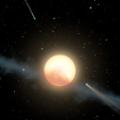




















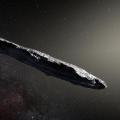





















































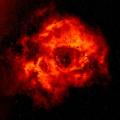
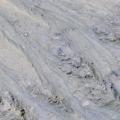

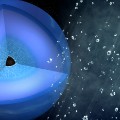
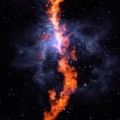



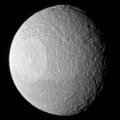

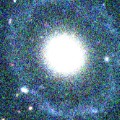
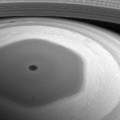

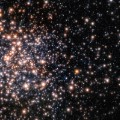
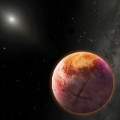
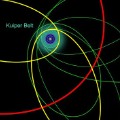
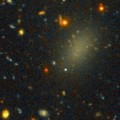
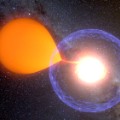

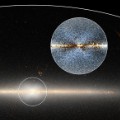
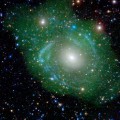

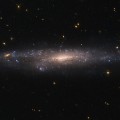
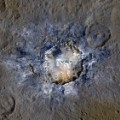
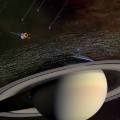


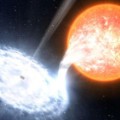


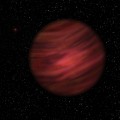
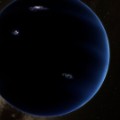


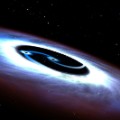

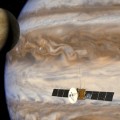
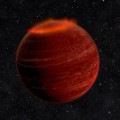
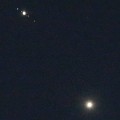
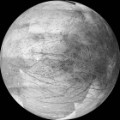
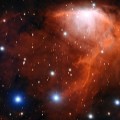
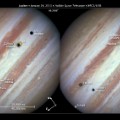

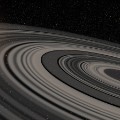
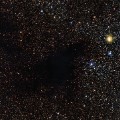








(CNN)A gas on Earth has also been detected in the atmosphere of Venus. The "entirely surprising" discovery of phosphine could hint at unknown processes occurring on Earth's "twin."
Phosphine suggests the presence of life on Earth. And the idea of aerial life in the clouds of Venus is intriguing. But it's not likely.
On Earth, phosphine is a flammable, foul, toxic gas produced by bacteria that doesn't require oxygen -- like those in swamps, wetlands, sludge or even animal guts. Its odor has been likened to decaying fish or garlic. It can also occur when organic matter breaks down.
Venus is similar in size to Earth and often referred to as Earth's twin, but it's not really.
Venus is an unusual planet that scientists are still trying to understand. It's our closest planetary neighbor, but it spins backward compared to other planets. The planet's thick atmosphere helps to trap heat, and its surface is hot enough to melt lead.
Above its hot surface, which is 900 degrees Fahrenheit, the upper cloud deck that's 33 to 39 miles above the planet's surface is much more temperate. But Venus' clouds are very acidic, which should quickly destroy phosphine. So how did it get there?
"Something completely unexpected and highly intriguing is happening on Venus to produce the unexpected presence of tiny amounts of phosphine gas," said Sara Seager, study coauthor and astrophysicist and planetary scientist at Massachusetts Institute of Technology, in an email.
The study authored by Cardiff University professor Jane Greaves and her colleagues published Monday in the journal Nature Astronomy.
Researchers used the James Clerk Maxwell Telescope in Hawaii in 2017 and the Atacama Large Millimeter/submillimeter Array in 2019 to study Venus. Their data revealed a spectral signature unique to traces of phosphine in the planet's atmosphere. The scientists estimated 20 parts-per-billion of the gas is present in Venus' clouds.
The research team considered surface sources like volcanoes, lightning, delivery via micrometeorites or chemical processes occurring in the clouds as potential causes. But the scientists weren't able to determine how the phosphine was produced.
The researchers were left with rather extreme possibilities, Seager said.

NASA's Mariner 10 spacecraft captured this view of Venus wrapped in a dense, global cloud layer.
"(One) is that some unknown chemistry is occurring in the Venus atmosphere, surface, or subsurface," she said in an email statement. "We find this explanation tough to accept because (of) Venus's temperature and pressure range and the fact that Venus has nearly zero hydrogens mean(s) phosphine is not the natural form of the element phosphorus. Instead phosphorus should be present as phosphates."
Future observations could reveal the source, as well as modeling to show why the gas is present in the atmosphere. And a future potential mission that could sample the clouds and surface may also shed light on the source.
However, it could be an indication of chemical or geological processes occurring on Venus that haven't been discovered yet or thought possible under the conditions on Venus.
Previously, a 2019 study, on which Seager was an author, suggested that phosphine may act as a biosignature for life if detected in "tremendous amounts" on rocky exoplanets. This large amount could be at an accumulated level that future telescopes, like NASA's James Webb Space Telescope, could detect.
"Phosphine on Earth doesn't exist outside of life's production because, like on Venus, Earth's environment is so very not favorable for phosphine production," Seager said. "Because Venus is so close and bright our study found much smaller amounts than are predicted to be needed on an exoplanet."
However, studying the atmospheres of rocky planets in our solar system provides a key test bed for trying to understand the atmospheres of exoplanets, or planets outside of our solar system, and if they could support life.
The research team will continue its search for the origin of the phosphine gas detected on Venus, as well as look for other unexpected gases in its atmosphere.
The discovery of phosphine on Venus elevates it to an area of interest worth exploring in our solar system alongside the ranks of Mars and "water world" moons like Enceladus and Europa, Seager said.
"Our hoped-for impact in the planetary science community is to stimulate more research on Venus itself, research on the possibilities of life in Venus' atmosphere, and even space missions focused to find signs of life or even life itself in the Venusian atmosphere," Seager said.





No comments:
Post a Comment